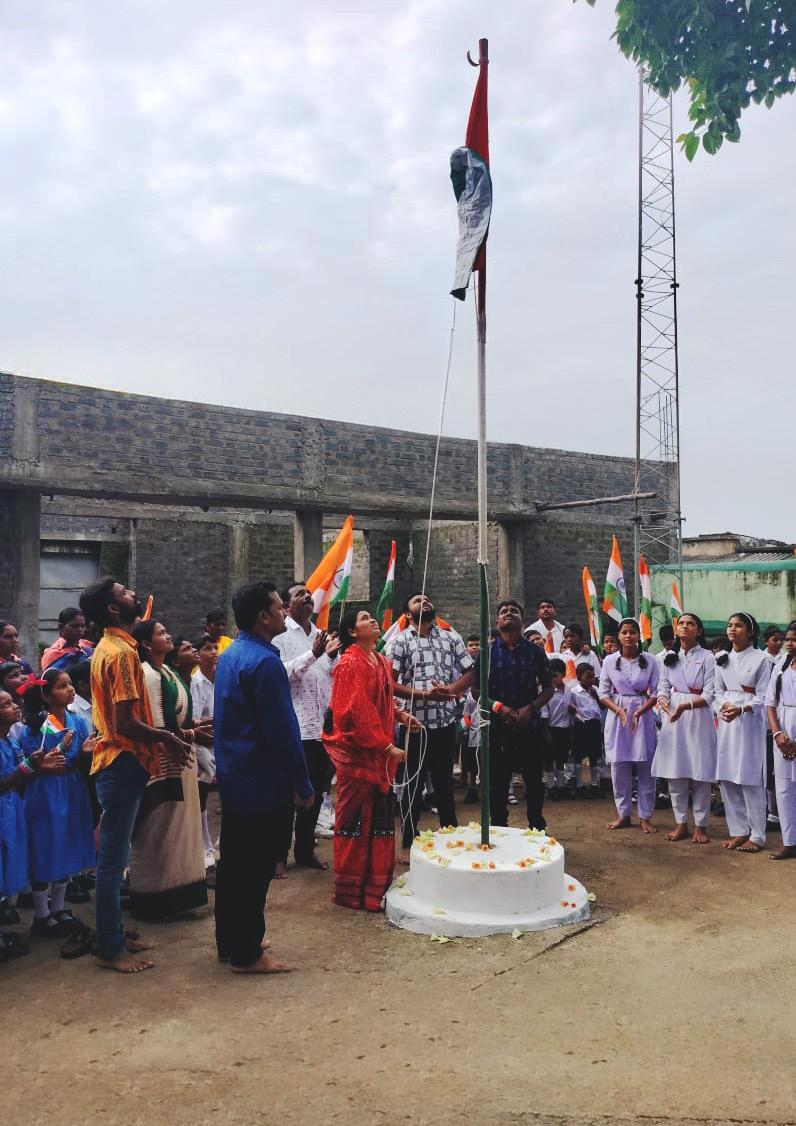
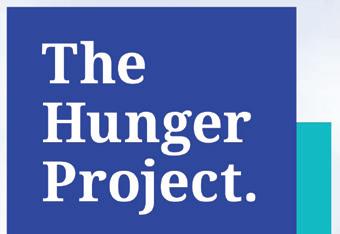

Published by: The Hunger Project, India
Design: Studio Eksaat
Cover Photo: Sasmita Hairpal, Sarpanch, Charbhata GP
Declaration: In compliance and as mandated under Section 22 of The Sexual Harassment of Women at Workplace (Prevention, Prohibition and Redressal) Act, 2013 The Hunger Project, India hereby declares that no complaints of sexual harassment were reported to its Internal Committee for the year 2022-2023.
CONTENTS
Message from THP India team //04 //34 //14 //46 //10 //38 //20 //49 //26 //30 01 03 Advancing Agency & Active Citizenship: Adolescent Girls 05 Financial Report 09 Critical Spaces: Reframing Dialogue 07 Thank You Donors About THP, India 02 04 Programme Highlights 06 THP India People 10 Impact, Change, Transformation: 2022 A Snapshot 08 //50 Contact Us Engagement With Local Communities: Elected Women’s Leadership and Agency
MESSAGE FROM THP INDIA TEAM
2022 marked the 75th year of India’s Independence. It was a proud and reflective moment for us as we remember the country’s journey since 1947. At The Hunger Project India (THP), we strive to uphold, promote and practice constitutional values. In 2022, we continued our mission of empowering elected women representatives and adolescent girls in a way that exemplified our core values of gender equality, social justice, human dignity, transparency and accountability. Our cover photo is a testimony to how an act of hoisting the national flag on Independence Day by a Dalit woman sarpanch embodies empowerment, dignity and voice, signalling the many strides towards deepening democracy.
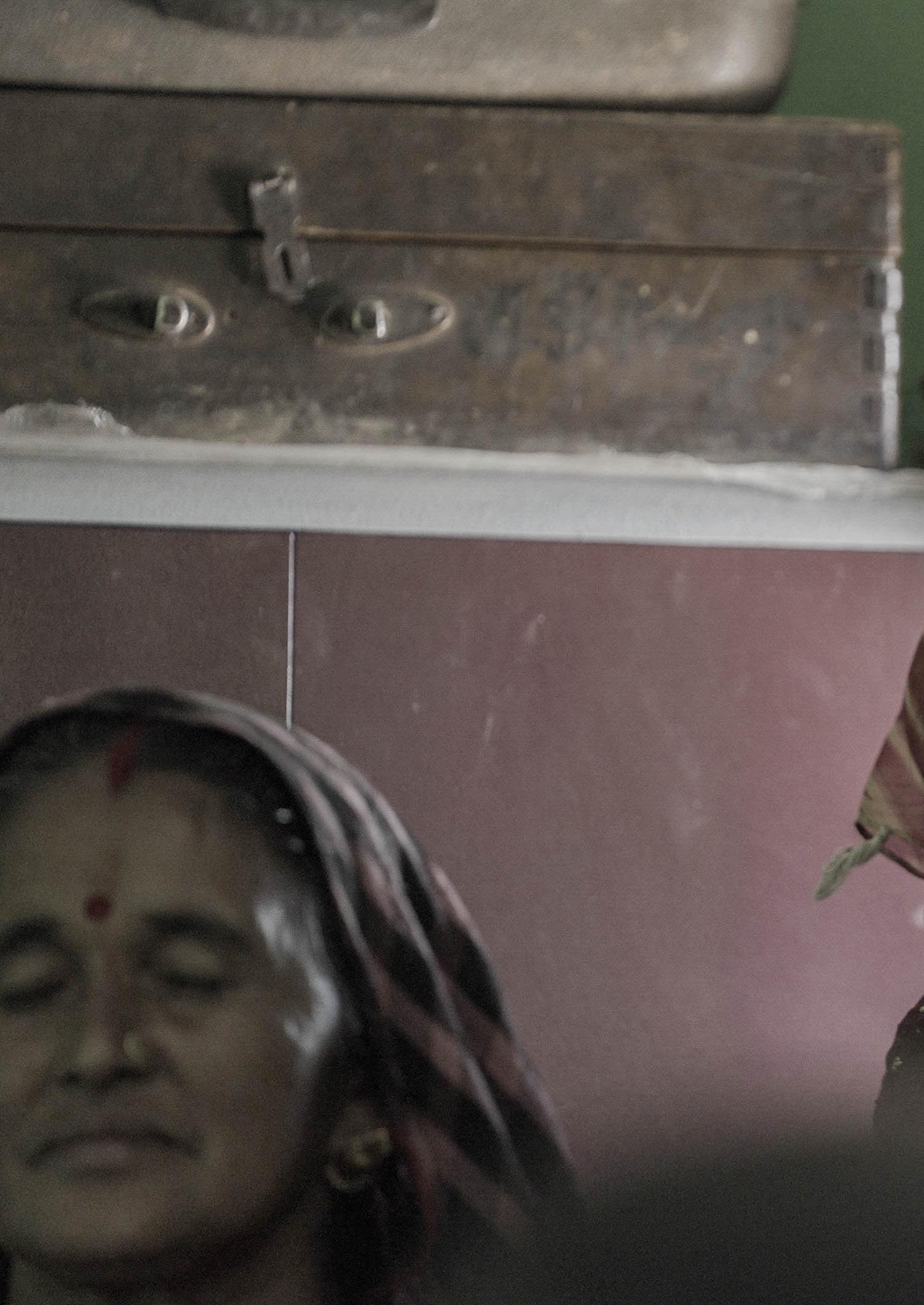
01
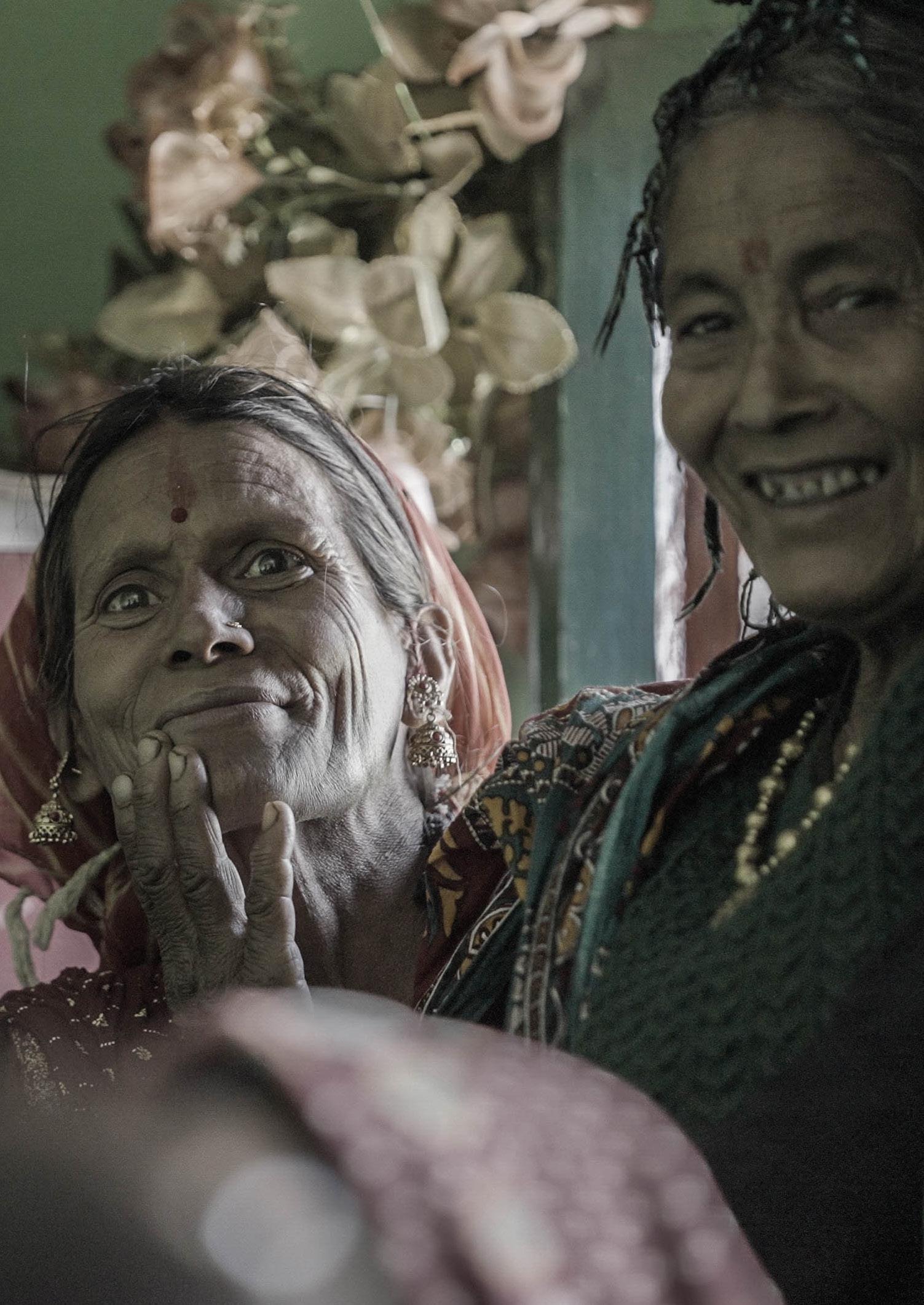
This year marked the end of Rita Sarin’s tenure as the Country Director of THP India. Rita retired in August 2022. She has been instrumental in giving shape to THP India under the Women and Panchayati Raj strategy since 2000. The team would like to take this opportunity to thank her for her exemplary leadership and enormous contributions in making THP India a national organisation of repute. We remain committed to building upon this legacy and carry forward our mission of building women’s leadership in local governance.
THP India continued to re-strategise its way forward, embracing new realities in the field. With regard to our work on empowering elected women representatives, in Madhya Pradesh and Uttarakhand, we carried out specific training on understanding the process and preparation of Gram Panchayat Development Plans (GPDP). In Uttarakhand, 230 elected women representatives of the powerful Veerangana federation from four districts and ten blocks came together for a state-level convention in Dehradun, where they spoke about their achievements and issues. In Karnataka, the adolescent girls’ programme expanded to 15 new panchayats. We are now working in 30 panchayats across four blocks in Bidar and Shivmogga districts. In Bihar, working towards empowering adolescent girls and introducing them to socio-emotional learning with the objective of preventing forced, early and child marriages has paved the way for girls vociferously demanding educational entitlements –functioning toilets, drinking water, improving school infrastructure, mid-day meal quality and regularization of teachers - and also negotiating with their families to continue school and attend THP India’s programmes.
The latter half of the year saw an intensive qualitative evaluation of the programme with elected women representatives in Madhya Pradesh over 2019-2022. It looked at the phenomenal feats of leadership of the elected women leaders in an exceptional environment of the COVID19 pandemic and delays in panchayat elections. The unfolding of the empowerment process in the local communities through village-level community multi-stakeholder meetings or the mothers’ committees showed how knowledge travelled from the enclosed meeting space into the community and impacted individuals.
The Hunger Project | Annual Report 2022 / 2023
We look back upon a year celebrating the team’s collective spirit, courage and resilience, and acknowledge some significant highlights:
THP India programme team conducted learning visits to different organisations working with women and adolescent girls on issues of livelihoods, digital and financial literacy. It was an exercise to see and explore good practices, and an openness to listen and learn from others.
The Monitoring Evaluation and Learning team continued its focus on rebuilding existing systems to increase their efficiency in systematically capturing the critical work done by elected women on the ground and measuring the impact of the interventions on adolescent girls.
As always, we thank the donor-investor community for their faith in our vision, strategies, and work. None of this would have been possible without their steady support and solidarity.
We continue to reflect on our practices, lessons learned, and respond to questions posed by a rapidly changing environment. We are proud to be in a strong position as an organisation. With gratitude to our fabulous team, we move forward, remain intentional and resolute towards our mission and vision, and build new paths!
7
The Hunger Project India Team
SINCE 2001,
The Hunger Project has engaged with 197,121 elected women representatives in Gram Panchayats across India. Currently, we are working in five states: Karnataka, Madhya Pradesh, Odisha, Rajasthan, and Uttarakhand.
Our Fundamental Principles are
Gender Equality
Collaboration
Decentralization
Accountability
Inclusion
Social Justice
The Hunger Project | Annual Report 2022 / 2023
is a world where every woman, man, and child leads a healthy, fulfilling life of self-reliance and dignity.
OUR VISION OUR MISSION
is to strengthen women’s leadership in gram panchayats (village councils) so that they are able to perform effectively as public office holders, practice good governance, and promote social and gender justice.
9
ABOUT THE HUNGER PROJECT IN INDIA
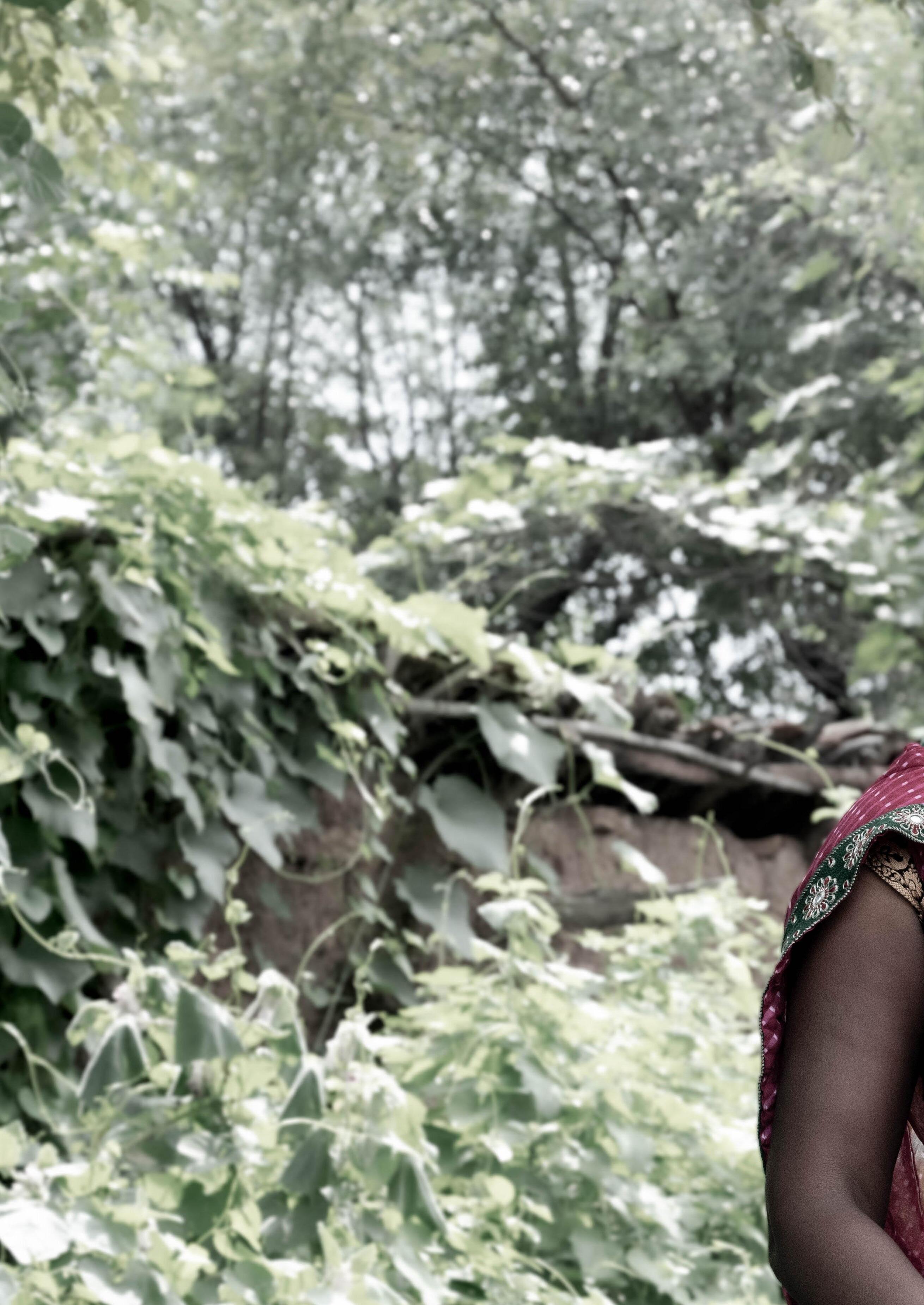
Who Are We?
THP India is a non-profit organisation committed to empowering women and girls in rural India. Foregrounded in the 73rd Constitutional Amendment of 1992, THP India has been working on strengthening the capacities of elected women representatives in gram panchayats. Over the last two decades, we have engaged with 197,121 women leaders.
What We Do?
THP India’s interventions have steadily aimed to build and bolster the leadership skills of elected women representatives. The core strategy is based on the premise that if elected women representatives in gram panchayats are imparted the knowledge, skills, and support to develop and strengthen their leadership, they become empowered to drive development in their panchayats, and ensure social justice and gender justice for all citizens. They are in a better position to prioritise issues, plan budgets, and promote good governance. The intervention strategies are closely aligned with the five-year cycle of their tenure, with each year requiring focused engagement and input.
02
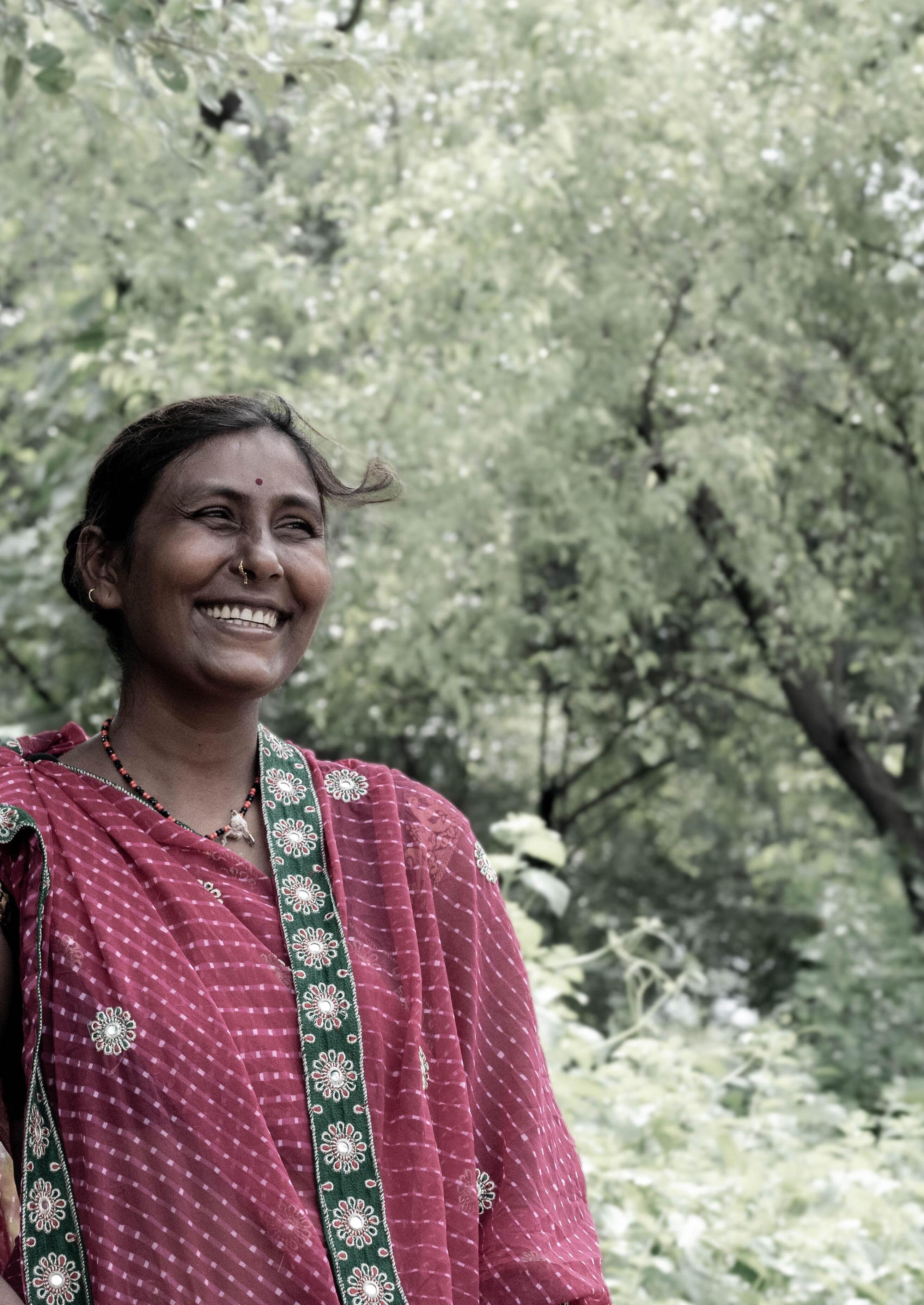
The strategy broadly involves the following elements:
Building leadership skills
Fostering an enabling environment through federations and jagruk manch
Dialogues with state governments, local administration, and media
Empowering adolescent girls
We are currently working with elected women representatives, across 858 panchayats, in the five states of Karnataka, Madhya Pradesh, Odisha, Rajasthan, and Uttarakhand.
As of today, they are exercising their leadership to ensure improved access to various rights, entitlements and government schemes - quality education, health services, food security, water, sanitation, electricity, forest conservation, and safe and violence-free panchayats.
Simultaneously, the adolescent girls’ programme continues its critical engagement with gram panchayats, making them responsive to the needs and aspirations of adolescent girls. In addition, we see girls emerging as active citizens and leaders in their communities, an encouraging shift in the way girls are empowered to use their voice to make decisions about different aspects of their lives and access rights, entitlements and panchayat services. The programme spans across 70 panchayats in two states – Bihar and Karnataka.
Our interventions remain committed to our vision, and to ensure gender equality and a just society. We continue to explore new and innovative pathways that seek to amplify voice and agency as well as strengthen the practices of good governance, accountability and transparency in villages.
The Hunger Project | Annual Report 2022 / 2023
13 34 DISTRICTS | 63 BLOCKS | 1210 PANCHAYATS 7389 ELECTED WOMEN REPRESENTATIVES 4000 ADOLESCENT GIRLS 2022 OUTREACH:
ENGAGEMENT WITH LOCAL COMMUNITIES
ELECTED WOMEN’S LEADERSHIP AND AGENCY
In 2022, THP India undertook a focused qualitative evaluation of its core programme in Madhya Pradesh (MP) for the interventions undertaken between 2019-2022. It reviewed and systematically analysed
a) the leadership journeys of elected women representatives; and b) the impact of THP India’s specific interventions on nutrition, food security, and livelihood linkages for communities in what was an exceptional environment of the COVID19 pandemic and delays in panchayat elections (which only took place in July 2022).
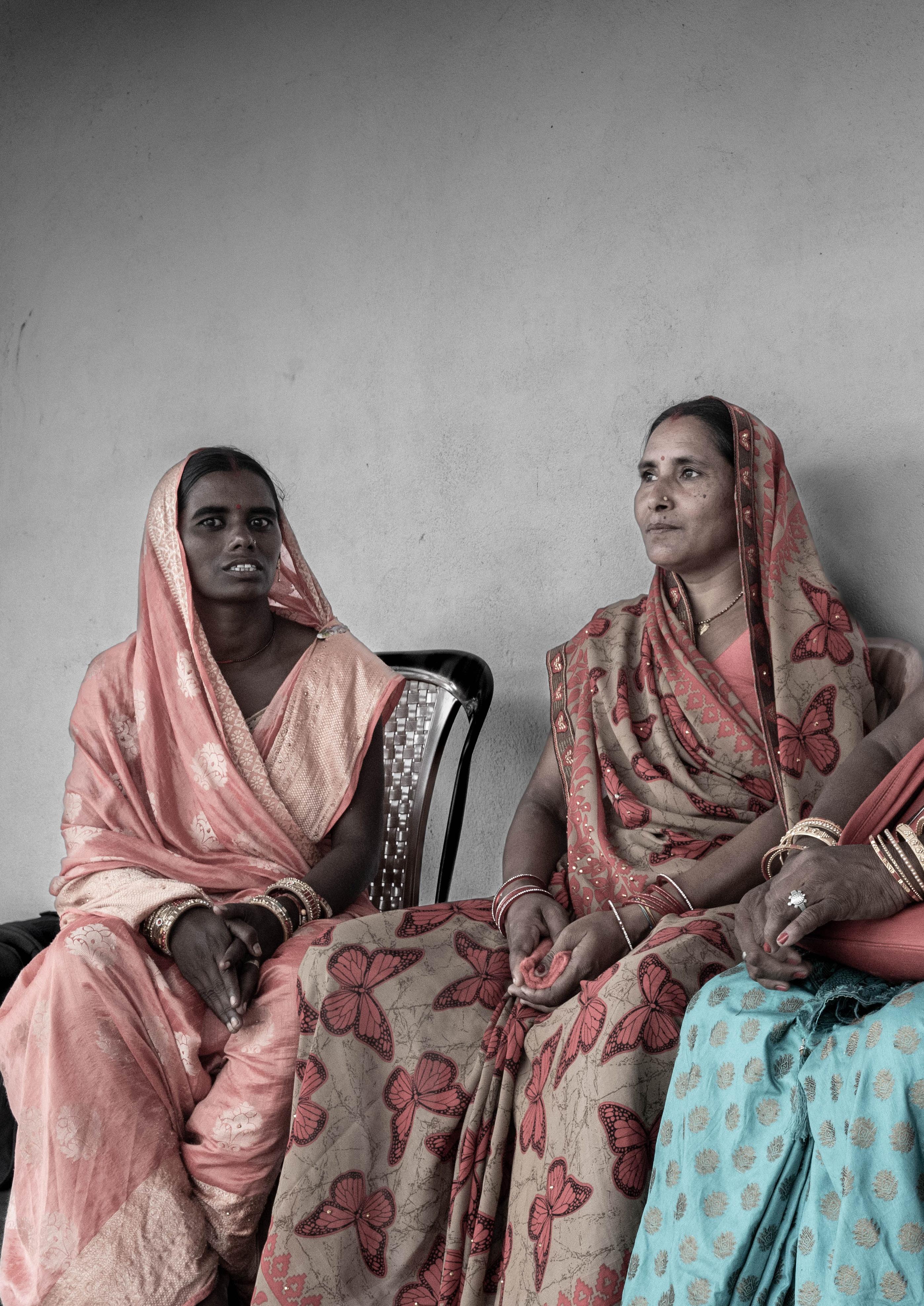
03
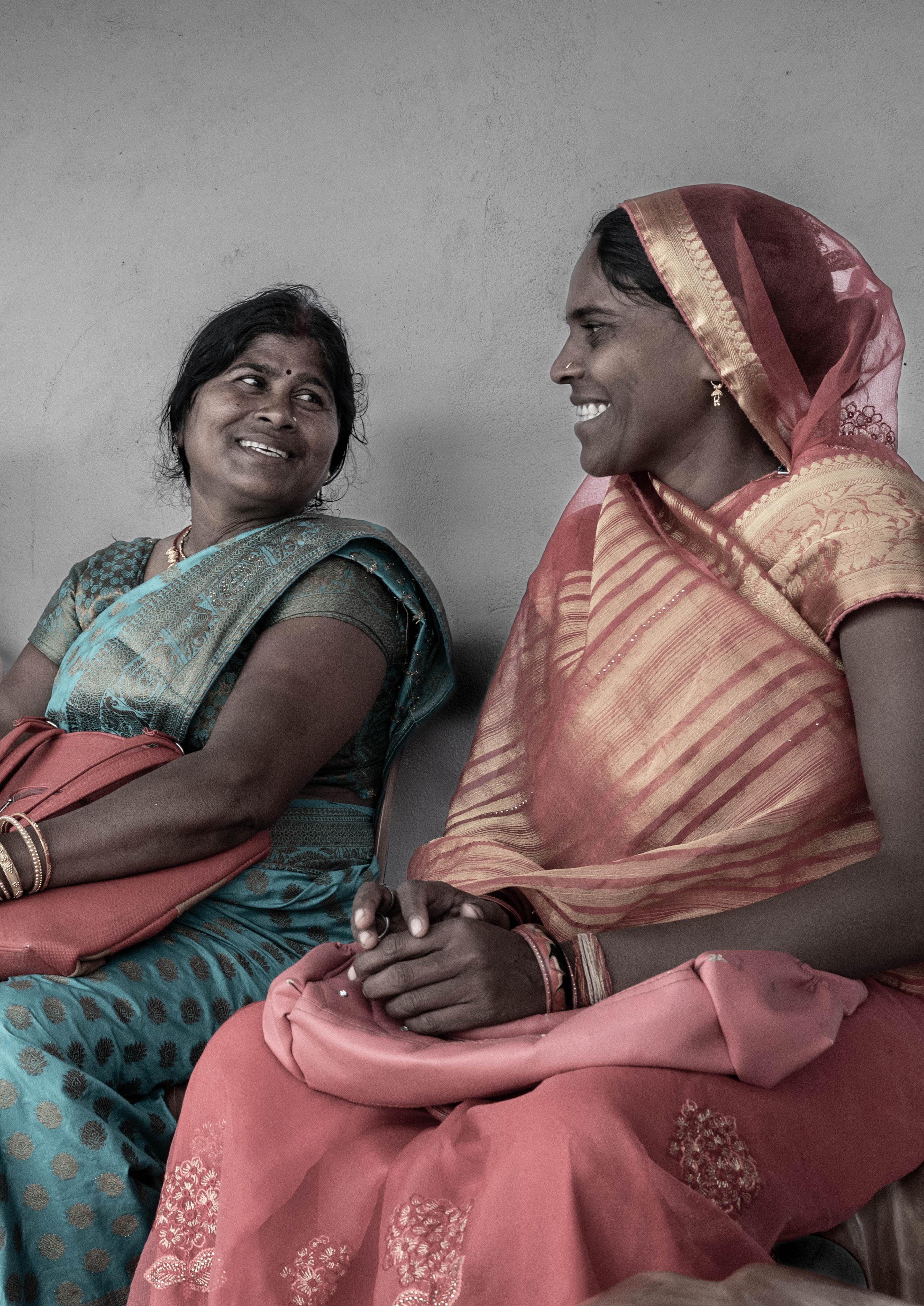
The assessment found strong evidence of what happens when women lead as public officeholders and how legacies are shaped, which attests to the significance of THP India’s presence in the intervention areas and its expansive theory of change. The vivid narratives and examples shatter social myths about who can lead and redefine grassroots leadership. We witness a combination of embodied leadership (where elected women learned to lead at a deeper level, building their self-awareness and capacity), and phenomenal will to exercise their power once equipped with technical tools and knowledge (which included information about panchayat governance systems). This is translated into actions that bridged critical gaps between citizens and their rights and entitlements during the pandemic crisis. Their leadership, despite the limitations (given the COVID19 context), was confident in its presence and intentional in its purpose and duty towards its citizens, especially the marginalised.
“We were not allowed to leave our houses (which often felt like a jail). [With THP India], I learned about my rights as a woman and how to be a leader. I can now articulate my thoughts and travel on my own. Don’t listen to gents! Step out, learn, and do the work. We need to occupy space and assert our right to be here. We are not committing a crime.”
“A girl who had lost her parents during the pandemic, was being ill-treated and physically and mentally abused by her guardians (uncle and aunt). When I intervened against that family and called the government helpline to get her safely to a children’s home, I was ridiculed and abused in community meetings by my election opponent for standing up for the girl’s rights. I had to seek police assistance for my safety.”
The Hunger Project | Annual Report 2022 / 2023
KALLI SAKET
Kalli Saket, 40, is a determined personality who decided to become sarpanch to ensure the panchayat had a functional infrastructure and facilities of all kinds –anganwadi, powerhouse, small bridges, bore well, access to entitlements (pensions), ration (via PDS shops), etc. She remains unbending in how she engages with the community to address their problems. “It has been all about learning, understanding, and putting that into practice. I still have the gumption, and I am able to support those who need me even though I no longer hold public office.”
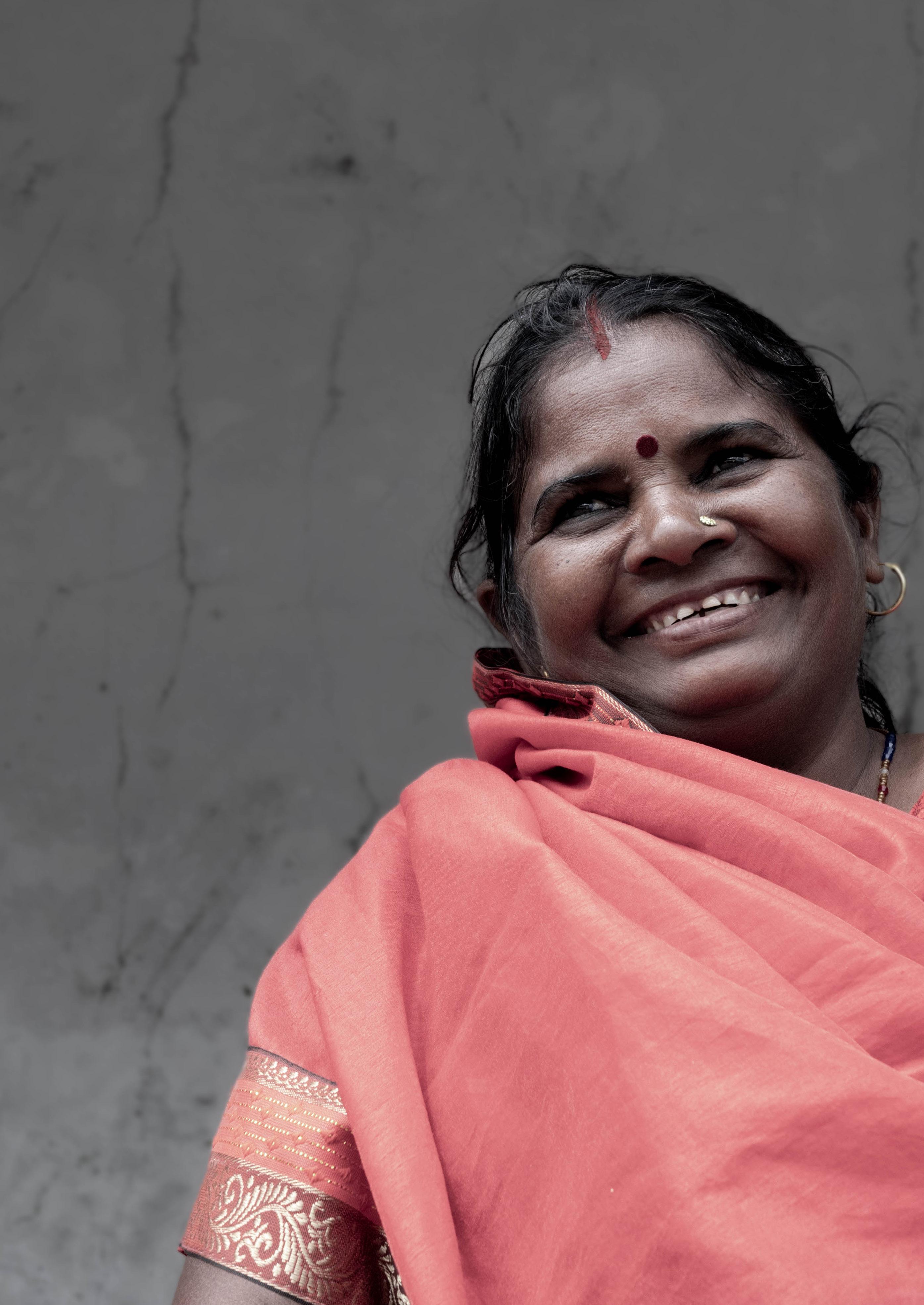
The most gratifying work for her as a sarpanch was constructing nine bore wells, which enabled 300 households in the SC colony to access regular clean water. Caste remains a deep-rooted structure that determines who has access to shared water resources. Earlier, community members had to travel long distances to fetch water. “Sometimes they even had to get water from a nearby drain because the upper caste families diverted the water towards their irrigation purposes, leaving nothing for the rest.” She leveraged the MLA fund, and the Public Health Unit resources to ensure Dalit households no longer were deprived or faced discrimination. Similarly, the construction of the bridges was another proud moment but also a struggle. She was up against the more affluent men of the panchayat who had encroached on the land, but she did not give up. “I went to the block office, spoke to the tehsildar, wrote petitions, went to the collector, and finally got the deed done.”
It is this legacy that affords her respect and acknowledgement. “I am still seen as a leader, and my work speaks for me and enables me to participate more mindfully.”
Beyond elected women, one of the principal endeavours of THP India in Madhya Pradesh had been to proactively connect people to government schemes and ensure they had steady and timely access to their rights and entitlements during and post-pandemic context. What came to be was an intensive community outreach and engagement programme through community multi-stakeholder meetings and leveraging state government initiatives like Matra Sahyogini Samitis (mothers’ committees).
These meetings created a safe space for learning and accessing knowledge, and intensified community response to issues of food security and malnutrition. Seema Saket, 28, spoke about her 2-year-old daughter’s poor health. Attending her first matra sahyogini meeting was a lifesaver “as we were immediately referred to the government-run Nutrition Rehabilitation Centre (care units meant for severely malnourished children below five years) by the anganwadi worker and the THP staff present at the meeting. During that time, we were not able to go for farm work, and there was a loss of income. The good thing about this system was that we received wage compensation for all the days we missed work.”
Similarly, as a result of community stakeholder meetings, which were geared towards nutrition, food security, and livelihood linkages for communities, many women, mostly belonging to Dalit and Adivasi communities, started small businesses. Securing safe livelihoods remains crucial to food security, and Rajkumari, 40, couldn’t be more jubilated as she narrated her experience. “My husband and I were daily wage labourers. It is not an easy job to work for others. Often, one is mistreated. On attending the meetings, I learned about a recently announced government loan scheme. We opened a small cycle repair shop next to the house.” She also reiterated the significance of having set up a kitchen garden and that access to different kinds of knowledge had strengthened her confidence.
During the assessment period, nutritional kitchen gardens remained a key initiative of THP India in MP to augment the food basket of communities. The expansive intervention focused on making vulnerable households aware of the benefits of having a kitchen, plant and nurture nutri-rich produce. Approximately, 3000 households thus far have been part of the initiative.
The positive impact and a visible multiplier effect in how knowledge has travelled have only further bolstered THP India’s steadfastness, and it continues these mediations with the same sense of purposeful commitment.
The Hunger Project | Annual Report 2022 / 2023
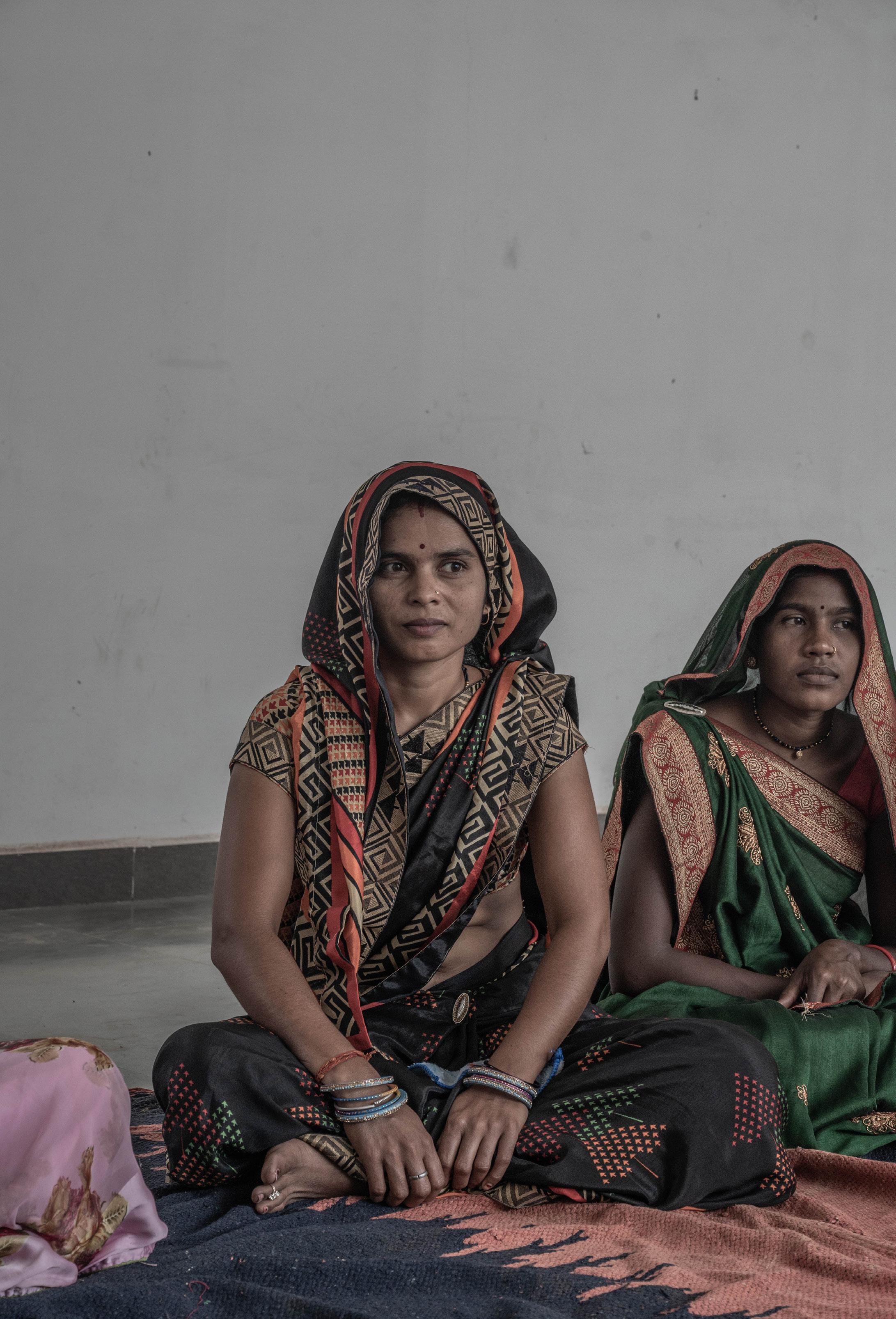
19
ADVANCING AGENCY & ACTIVE CITIZENSHIP
ADOLESCENT GIRLS
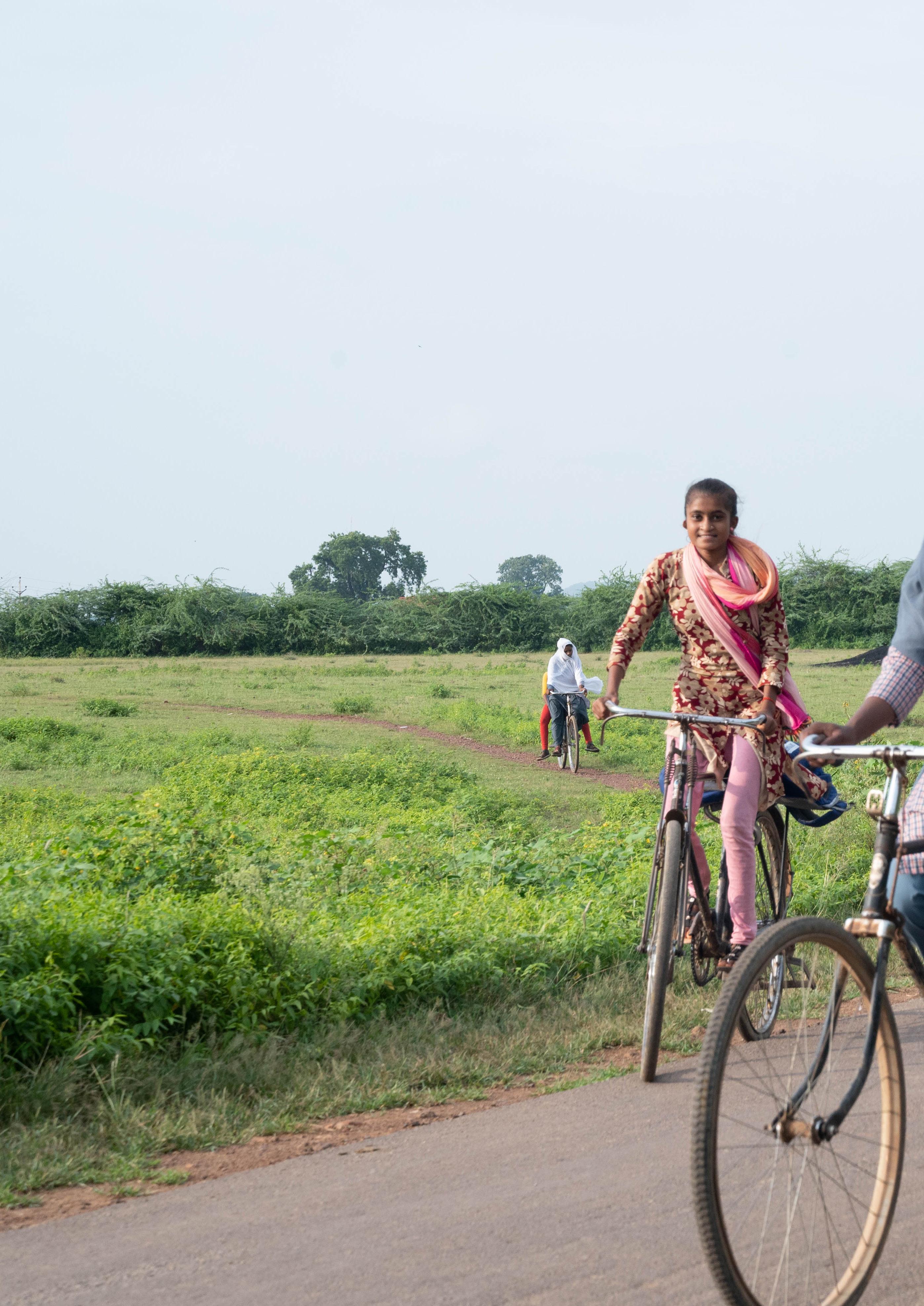
04
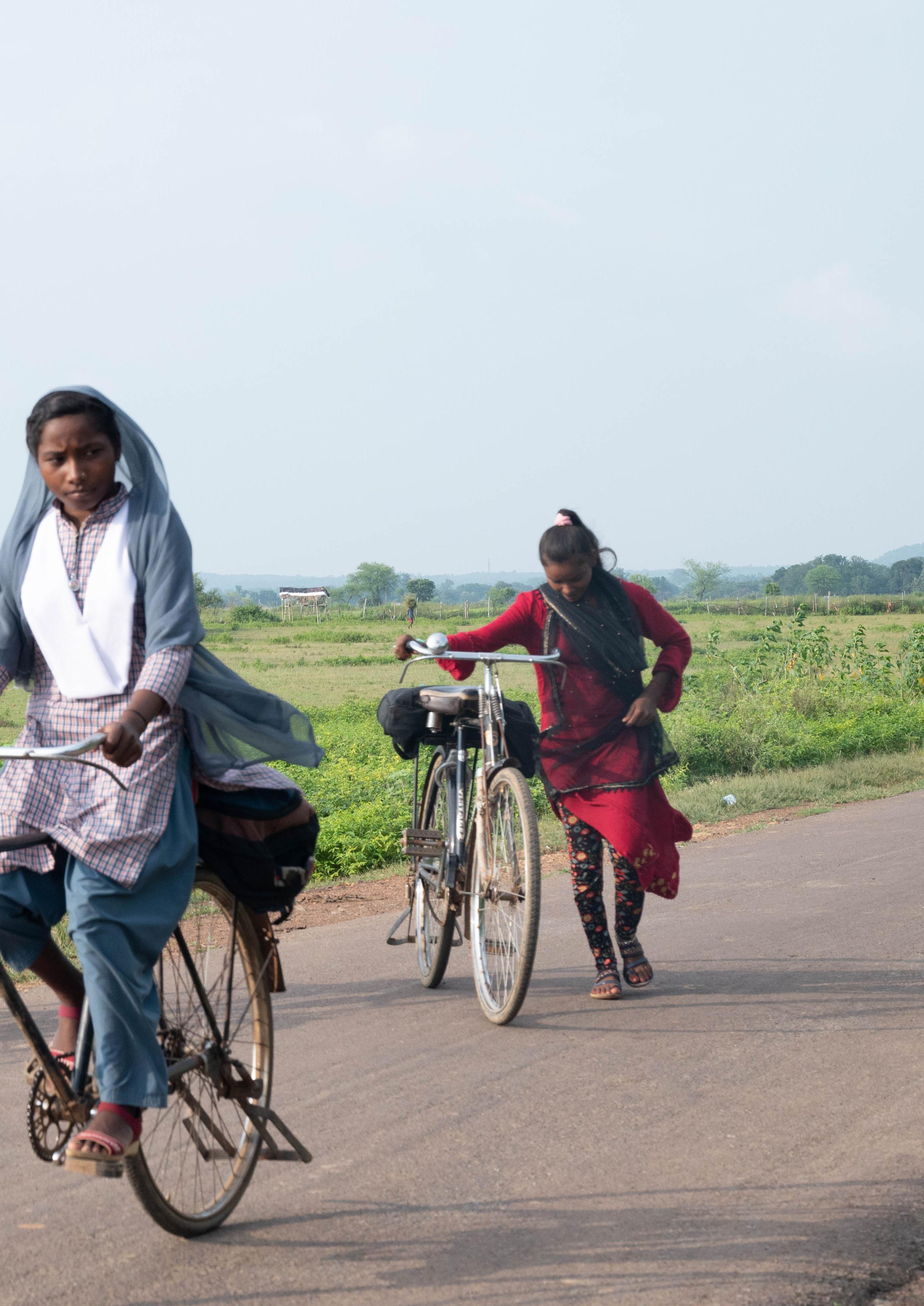
The adolescent girls’ programme over the past eight years has evolved in myriad directions and strengthened adolescent girls’ voice, agency and choice through girls’ leadership workshops, life-skills education and need-based interventions. Its twopronged approach combines elements of girl-centric leadership programming that promotes an empowered sense of self with an intentional focus on making local governance institutions responsive to girls’ needs and rights.
As a result, what we witness, is a critical process of knowledge-building and consciousness-raising, which has enabled girls to emerge as individuals in their own right who have dreams, aspirations and agency. This is further channelled into acts of leadership in their communities (delaying marriage, demanding a college, access to healthcare, safe panchayats), including engagement with different panchayat actors (elected women, interface with government officials, service providers (PDS dealer, ASHA worker, school management committee to name a few).
The Hunger Project | Annual Report 2022 / 2023
In Rajasthan, a qualitative endline evaluation of the programme between 2019-2022 lucidly showcases the transformative impact in terms of girls asserting their rights and challenging patriarchal norms and power structures. For instance, in their aspirations for the future they articulated the need for financial independence. It is most visible in how girls were applying for a range of jobs (tailoring, MGNREGA mate, retail stores) and courses (nursing, computer, ITI). “I learnt to stand up for myself, and understood that I can be my own leader and influence people,” said 17-year-old Kalyani.
In the context of Bihar, we see both girls’ agency and responsive institutional mechanisms coming into play together. THP India’s extensive work on activating and strengthening the School Management Committees (SMCs) to ensure they are performing their role with accountability has yielded powerful narratives of girls raising their voices and articulating important demands related to education (infrastructure maintenance, clean drinking water, toilet facilities, quality mid-day meal, regular teacher attendance) and safety (challenging caste discrimination, addressing sexual harassment).
Similarly, in Karnataka, active citizenship is manifested in the form of Child Rights Protection Committee (CRPCs) meetings initiated by THP India at the gram panchayat level. 38 such meetings were held in which 645 adolescent girls interfaced with elected women representatives and panchayat officials, actively raising concerns and finding resolutions for the distribution of sanitary pads, broken toilets, the regular opening of libraries, the appointment of teachers, boundary walls in schools, street lights in unsafe areas.
We also see active shifts in how girls are imagining futures for themselves that challenge early and child marriage. Close to 90% of girls engaged in the programme were able to negotiate delay or said no to marriage. This has been largely possible due to conscious interventions. For instance, advanced workshops were organised addressing the issue of sexual reproductive health and offering girls the information and skills they need to make informed decisions about their lives. Peer networks in the form of Sukanya Club (Bihar) and Kishori meetings (Karnataka) remain an integral element of the programme where girls learn how to articulate their needs and advocate for change in their communities.
All these strategies under the programme initiative have only further accelerated efforts to ensure adolescent girls are aware of their rights and opportunities, have access to accurate information and services regarding their education, health and well-being, and are able to participate and contribute to addressing social issues that affect them as active citizens in gram panchayats.
23
am a Dalit.”
Kavita, like the majority of girls in rural Bihar, experienced immense pressure to undertake household chores or work outside to support the family income. In her case, she was often unable to finish schoolwork because of added housework. “I would be punished harshly at school by the teacher. Once, I was badly chided and caste names were hurled at me because I am a Dalit. The teacher would say things like, ‘You and girls from your caste don’t need to be educated you will get married anyway. You are unnecessarily crowding the classroom.”
Kavita felt hurt and disrespected. She decided not to go to school. Later Kavita and her parents raised the matter in the SMC meeting with the help of THP India staff. All the SMC members and school administration condemned the incident. The SMC president made a written complaint to the Block Education Officer against the teacher. The escalation forced the teacher to accept his mistake, and he vowed not to repeat it. For now, Kavita and other girls from Dalit households continue to attend school without any fear and hesitation.

The Hunger Project | Annual Report 2022 / 2023
“I would be punished harshly at school by the teacher. Once, I was badly chided and caste names were hurled at me because I
In 2022, Gayatri became the vice president of the locally formed CRPC. She recalled, “Attending bi-monthly meetings and other THP India trainings gave me the confidence to articulate our collective needs better and, in turn, allowed me to think I can lead.” When the opportunity arose, she took it. She wasted no time in identifying issues pertaining to the anganwadi building at the CRPC meeting. The excessive rains had resulted in dampness, seepage and flooding problems forcing the centre to remain shut on most days. The stocked provisions became unusable. This hampered young children’s access to timely health check-ups, supplementary nutrition, and preschool education. For adolescent girls, especially out-of-school girls, access to take-home rations was also affected. To address these, Gayatri, along with other member girls and the elected woman representative, submitted a letter to the gram panchayat, who took it up with the relevant department. Following this, inspection and repair work was carried out. Her efforts ensured that all the 20 children (including adolescent girls) were able to access the various services, but also pregnant women who would visit the centre obtained a balanced meal under the Mathrupoorna scheme.
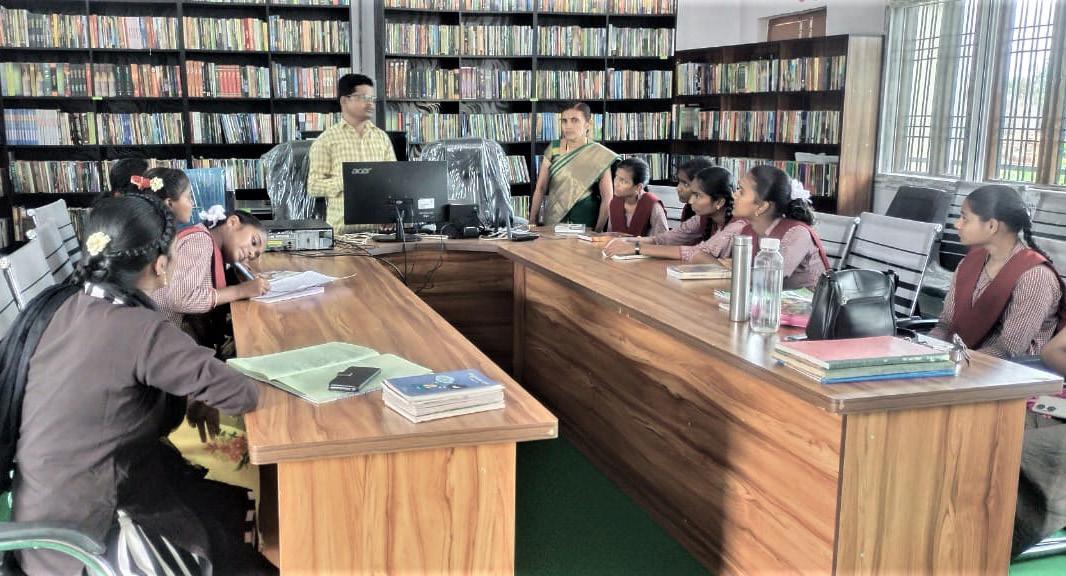
25
“Attending bi-monthly meetings and other THP India trainings gave me the confidence to articulate our collective needs better and, in turn, allowed me to think I can lead.”
05
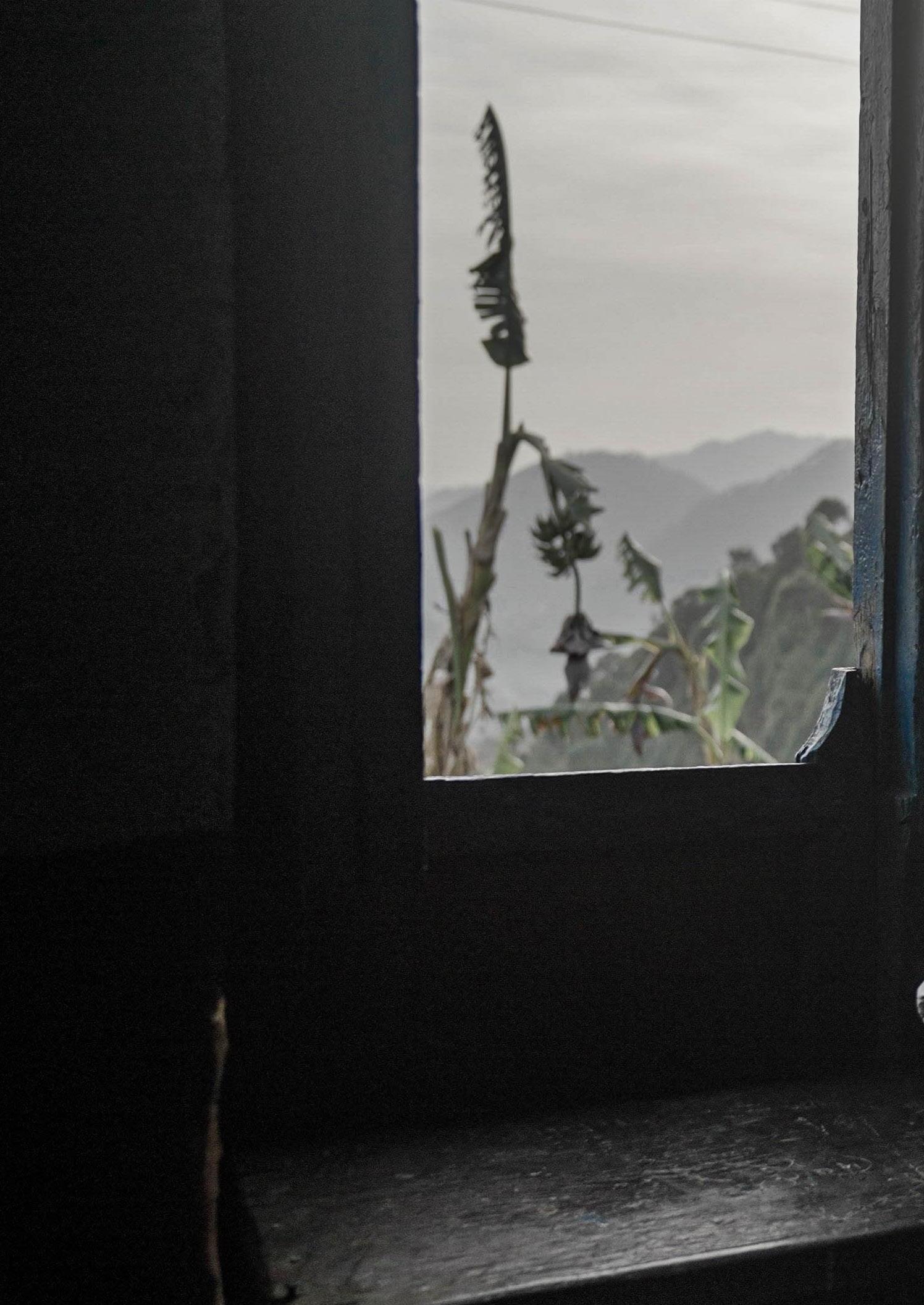
PROGRAMME HIGHLIGHTS
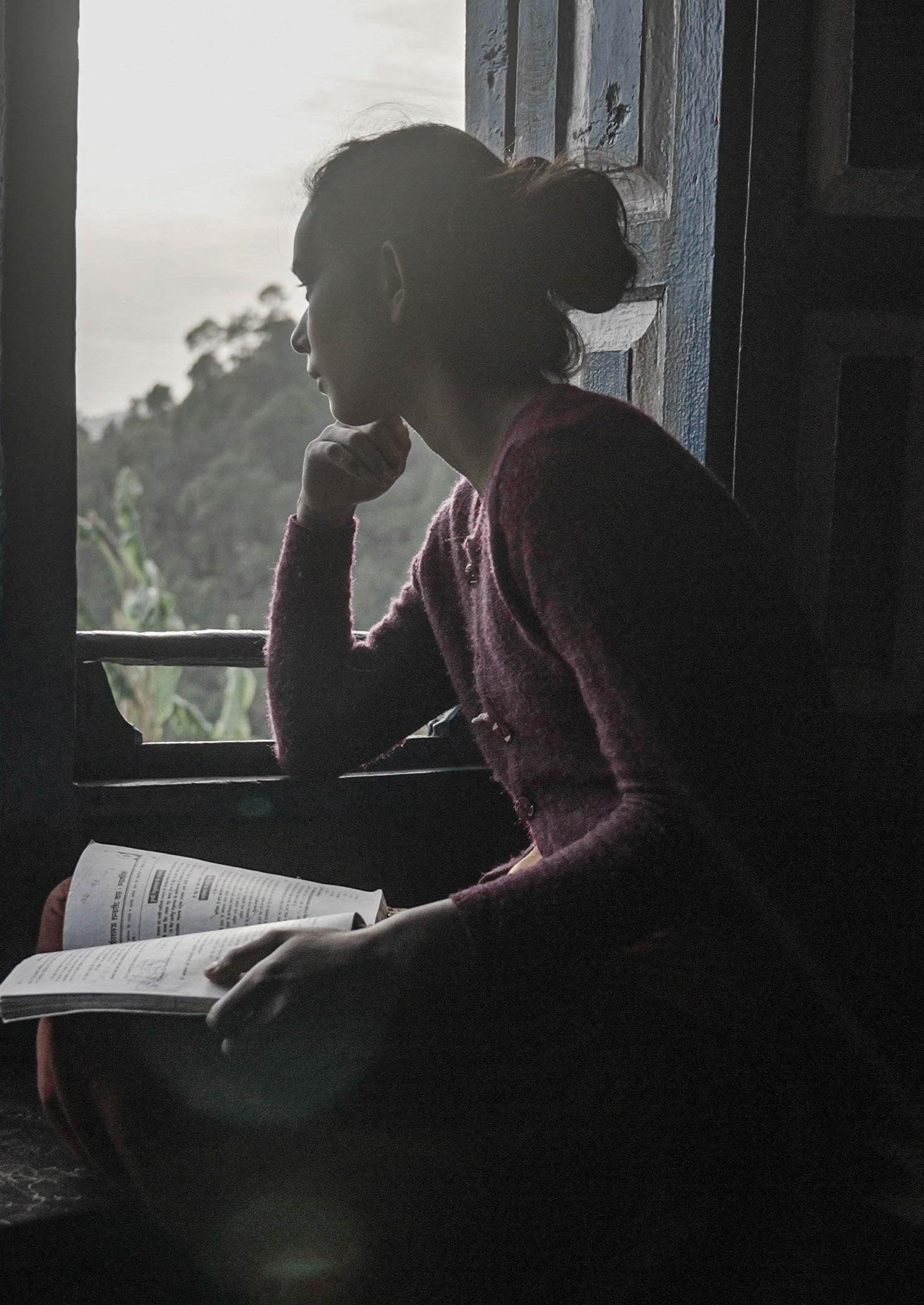
230 elected women representatives from four districts, ten blocks (in Uttarakhand) of the powerful Veerangana federation, came together for a state-level convention in Dehradun. They shared myriad experiences, achievements, and challenges, and presented motions related to violence against women and the need for a state-level policy for women to the Chairperson of the State Commission for Women. Other issues discussed included - the appointment of teachers in schools, functional healthcare centres, removal of illegal liquor shops in the panchayats, check illegal sand mining, and honorarium for ward members, to name a few. Subsequently, a petition including these demands was submitted to the Chief Minister’s office.
Need-based workshops, also known as technical trainings, were held in Rajasthan and Odisha, and attended by 2459 elected women. These meetings provide focused inputs on themes that may require deeper engagement. These included: the significance of ward sabhas, mahila sabhas, palli sabhas, understanding gram panchayat budgets and processes of financial management, knowledge of Sustainable Development Goals and situating work in the context of nine themes as defined by the central and state governments.
86 regular bi-monthly meetings at the block level and 98 village level meetings across panchayats in Karnataka saw 739 adolescent girls participating in a diverse range of activities focused on life skills, especially handling stress, identifying challenges, and engaging with elected women and other service providers. For instance, with increased access to information, 322 girls took up issues ranging from improving services in ICDS centres and schools, and availing social protection schemes for their families.
In Bihar, five block-level conventions were organised across three blocks (Marwan, Jha Jha, Tilouthu), facilitating interactions between 488 adolescent girls, 13 government officials, and several other stakeholders (panchayat representatives, Child Helpline, Child Welfare Committee and Juvenile Justice Board representative). Education, safety, health, nutrition and availability of public services for the girls were raised in these dialogues. One of the areas which saw improvement as a result of these exchanges is the opening of two rural libraries in Tilouthu panchayat and eight school libraries across three blocks. This must be seen as a massive boost to creating a conducive learning environment.
The Hunger Project | Annual Report 2022 / 2023
As a strategic support structure at the local level, jagruk manches (women’s collectives) have been tremendously successful in raising awareness, mobilising, and amplifying women’s voices and elected women’s participation in local governance. 240 such meetings were held in Rajasthan, 578 in Karnataka, and 1079 in Uttarakhand. Major themes included delay in MGNREGA payments, information about livelihood, addressing issues of water, housing, incidences of VAW and child marriage, access to social security schemes, and proper utilisation of Village Health, Sanitation and Nutrition Committee’s funds.
THP India produced a third series of interactive animation films explaining concepts of active citizenship and fundamental rights. This is part of THP India’s continual effort to build a resource archive, which is diverse and vibrant, and relevant to its training and learning processes.
In November 2022, the national and state programme teams met in Bangalore, Karnataka, to build a collective understanding of pertinent issues (operational and strategic) and plans for 2023 with outlining of key focus areas. Energising and invigorating presentations and learnings from programme, monitoring and evaluation, and communications leads helped in formulating a way forward.
29
CRITICAL SPACES
REFRAMING DIALOGUES
For women’s leadership to have a significant impact on local governance, there is a substantial need to advocate for the promotion and protection of women’s rights in the larger sociopolitical discourse around women’s participation and representation in local democracy. Similarly, shifting power to girls and youth is necessary for authentic change to happen.
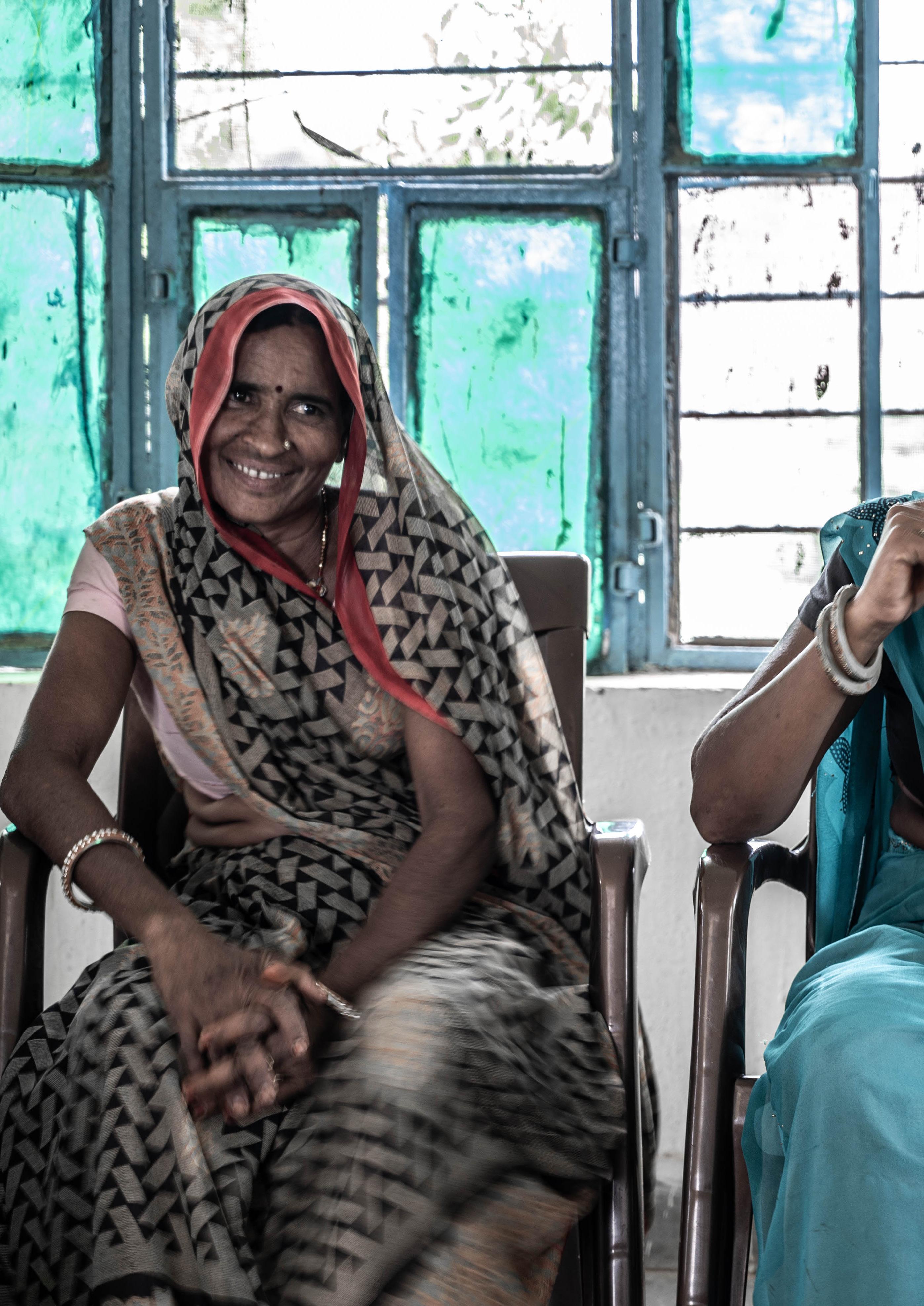
06
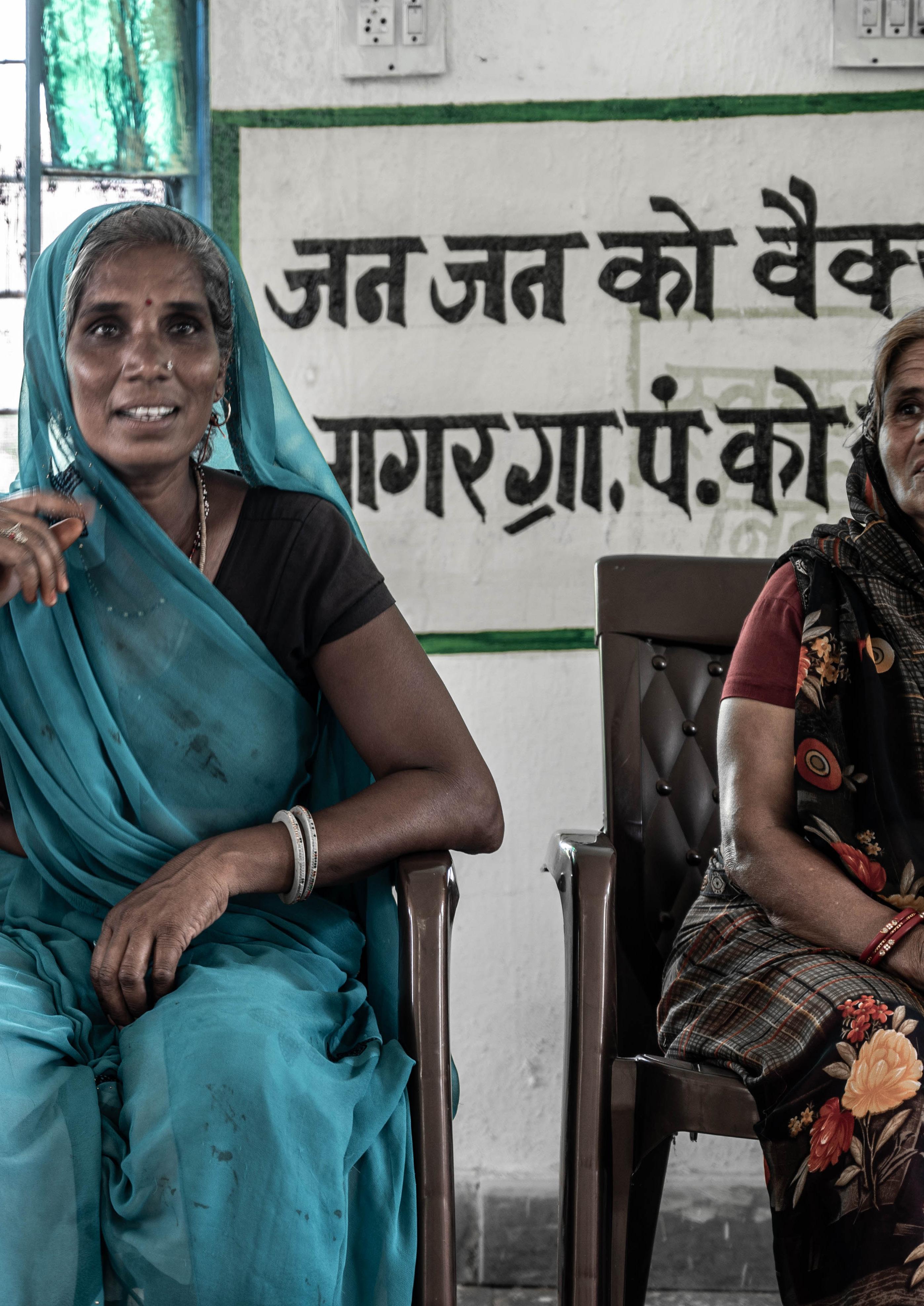
IN 2022,
THP India gained momentum in its presence in critical spaces both at the national level and on global platforms. We have spoken about the intersections between access to leadership positions and democratic social change. We have come together with partners to amplify the voices of women and girls, exploring strategic alliances that would shape policy dialogue for the future. Following are some of the key highlights of advocacy-related interventions and critical spaces attended.
The Hunger Project | Annual Report 2022 / 2023
THP India submitted inputs based on its strategy to empower adolescent girls to the Ministry of Youth and Sports for the draft National Youth Policy 2021. The Young Voices National Movement has led and coordinated this process. Over 2500 young people (15-25 years) and 95 civil society organisations across 15 states participated. (July 2022)
THP India was invited to participate and conduct lectures on Local Democracy and Development at Azim Premji University, sharing THP India’s strategy with NGOs from across India. (September 2022)
On the occasion of the 2022 Fall event ‘The Future Is Calling’ Veda Bharadwaja (Senior Programme Officer) attended the annual gala event in New York. In her presentation, she spoke about the need for a collaborative approach to confront complex issues of inequality and building human potential. (October 2022)
THP India provided critical inputs to the draft State Women’s policy, Uttarakhand. This initiative was led by Action Aid, Arpan, UNDP and Centre for Public Policy for Good Governance (Uttarakhand government’s nodal agency set to meet the targets under localisation of SDGs work). (December 2022)
Kanika Kaul (Senior Programme Officer) participated in a ‘Fireside Chat’ organised by THP and Bridge the Gap Ventures about the importance of youth leadership in ending hunger. The event also had representatives of THP Mexico and Malawi and focused on various dimensions of youth participation, challenges and opportunities in addressing hunger. (February 2023)
On the occasion of International Women’s Day, Veda Bharadwaja was invited to attend an online engagement with Swedish Board member Gina Azaric and other participants to share about THP India’s strategy to strengthen elected women’s leadership and advancing girls’ rights and agency in India. (March 2023)
33
IMPACT, CHANGE, TRANSFORMATION
THP India’s monitoring, evaluation, and learning priorities continued to focus on strengthening existing systems, field teams’ capacities, and building efficient ways of capturing data and outcomes. Data visualisations, data walks, and evaluations remain crucial components in not only establishing robust learning and feedback loops and documenting impact but also leveraging evidence to advocate for transformative change.
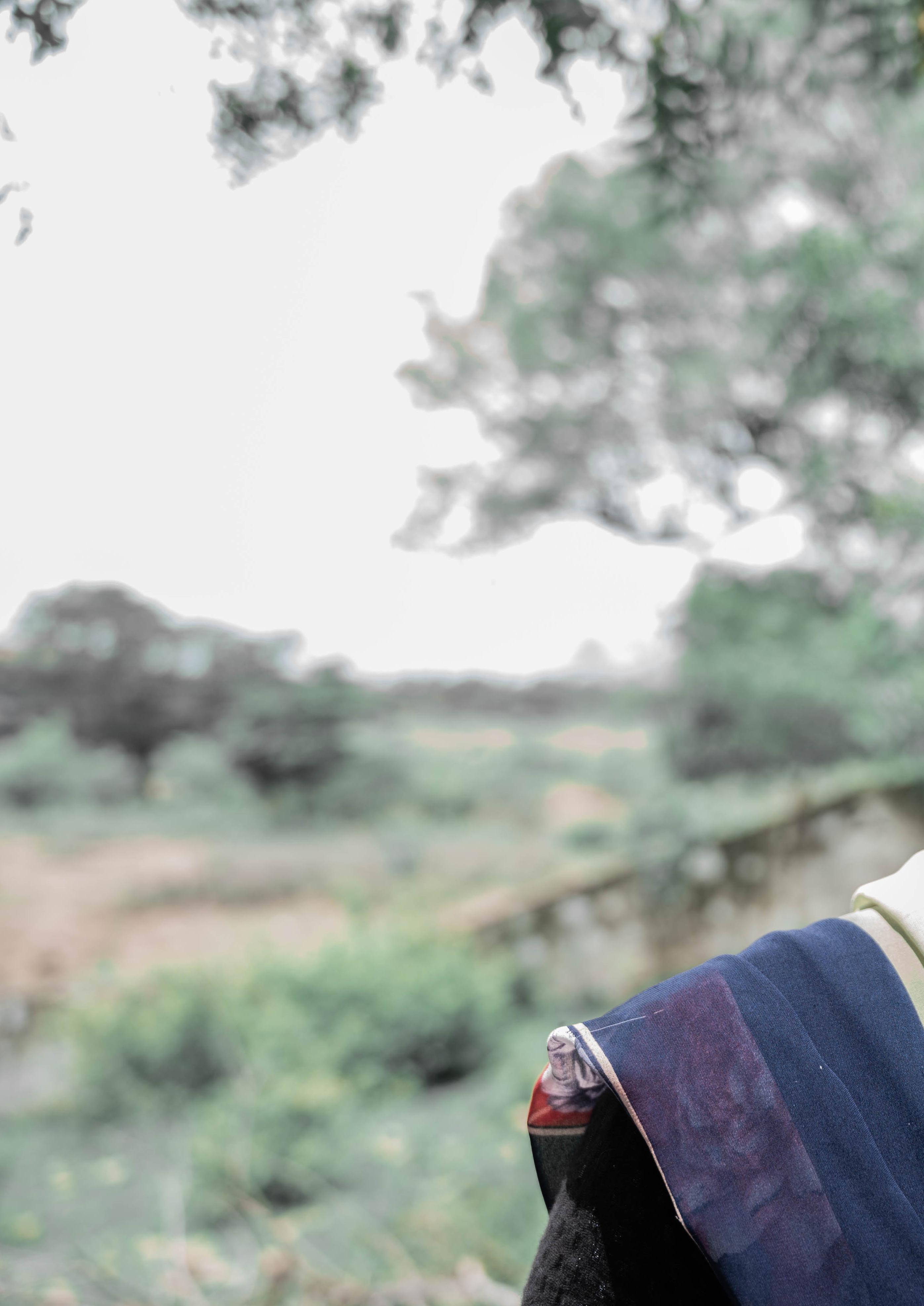
07
2022 A SNAPSHOT
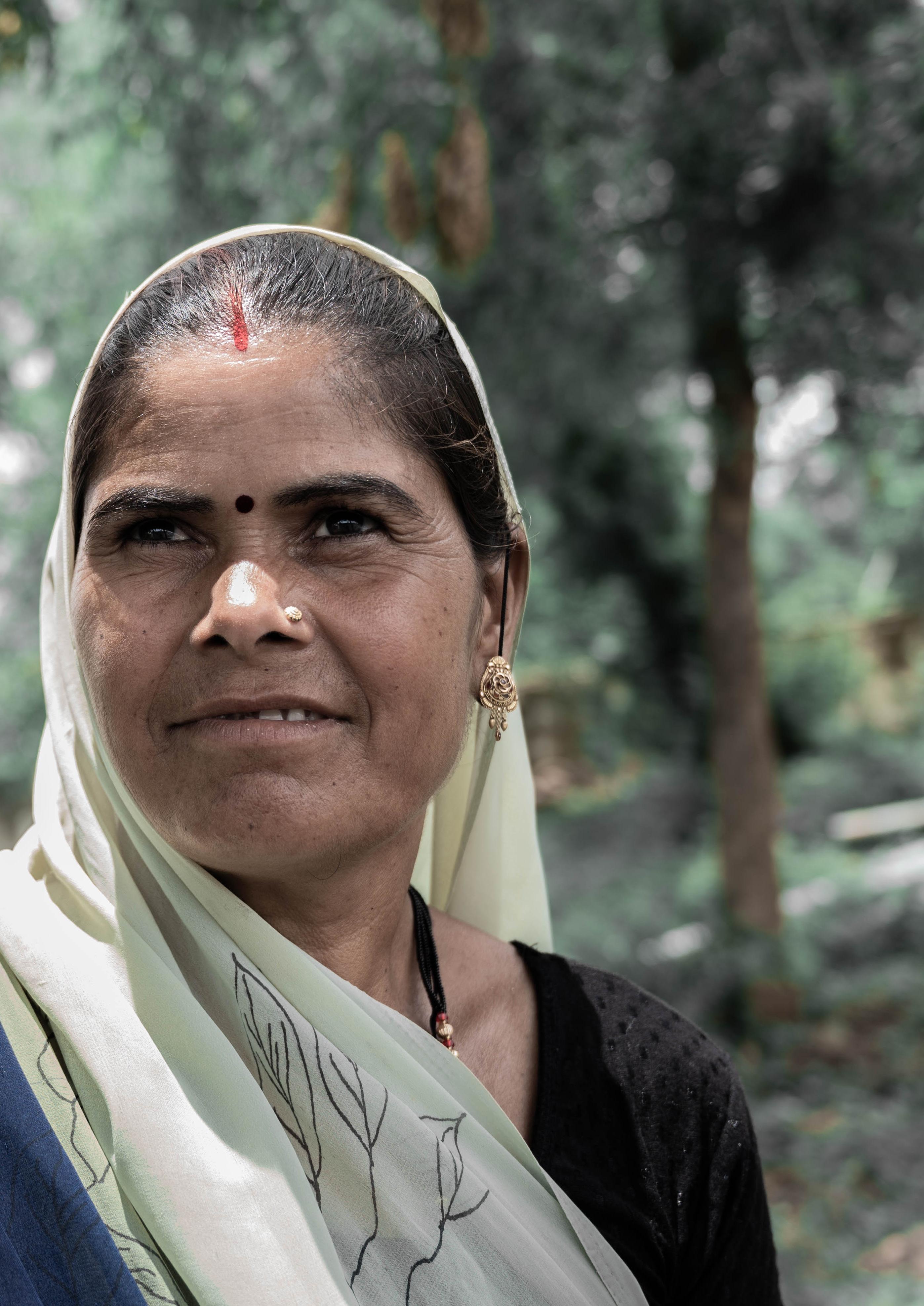
FOOD SECURITY, HEALTH AND NUTRITION
13,990 households linked to ration cards
6,760 anganwadi centres monitored
8,000 children enrolled into ICDS centres
1,339 malnourished children enrolled in NRC
2,710 ration shops with streamlined food distribution
2,061 primary health centres, sub-centres monitored by EWRs
754 appointments of doctors, nurses, and other staff across health centres
10,224 toilets constructed (public and private)
1,88,643 new water connections (public and private)
HEALTH AND SANITZATION EDUCATION
4,477 girls enrolled in any higher education facility (after 12th) with the support of EWRs
11,832 children enrolled into schools
17,698 children linked to scholarships or other schemes with the support of EWRs
5,113 girls who had dropped out re-enrolled into the formal education system
1,296 appointments of teachers and other staff across schools
The Hunger Project | Annual Report 2022 / 2023
113,105 linked to MGNREGA (job cards and work accessed)
21,000 people linked to pensions (single women, old age, widow, differently abled)
EMPLOYMENT AND SOCIAL SECURITY SAFETY IN PANCHAYATS
157 child marriage cases registered on ChildLine with support from EWRs
568 domestic violence cases addressed by EWRs
49 child marriage cases reported by girls to EWRs; action taken
217 illicit liquor shops closed
12,139 street lights installed
PETITIONS
18,907 petitions to improve the quality of services across ICDS, schools, health centres, PDS shops submitted by EWRs
37
08
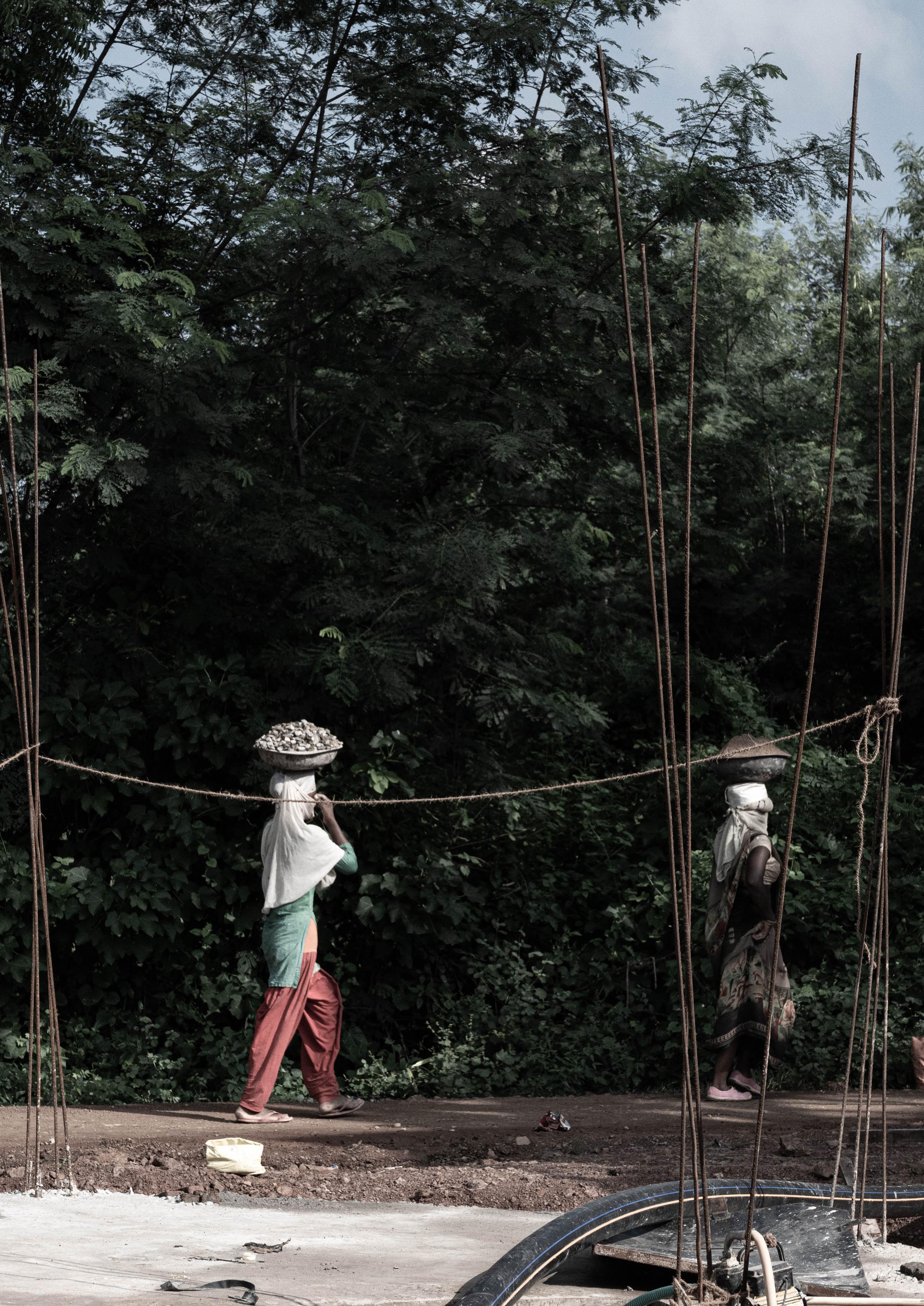
FINANCIAL REPORTS
39
Financial Facts
Independent Auditors’ Report to the trustees of The Hunger Project-India
Opinion
We have audited the financial statements of The Hunger Project-India (the Trust), which comprise the balance sheet at March 31st 2023, and the Statement of Income and Expenditure for the year then ended, and notes to the financial statements, including a summary of significant accounting policies.
In our opinion, the accompanying financial statements give a true and fair view in accordance with the Accounting Standards issued by the Institute of Chartered Accountants of India (ICAI) in the case of:
a. Balance sheet, of the state of affairs of the trust as at 31 March 2023, and
b. Statement of Income and Expenditure, of the excess of Income over Expenditure for the period from 1 April, 2022 to 31 March, 2023.
Basis for Opinion
We conducted our audit in accordance with the Standards on Auditing (SAs) issued by ICAI. Our responsibilities under those standards are further described in the Auditor’s Responsibilities for the Audit of the Financial Statements section of our report. We are independent of the entity in accordance with the ethical requirements that are relevant to our audit of the financial statements under fair presentation framework, and we have fulfilled our other ethical responsibilities in accordance with these requirements. We believe that the audit evidence we have obtained is sufficient and appropriate to provide a basis for our opinion.
The Hunger Project | Annual Report 2022 / 2023
Responsibilities of Management and Those Charged with Governance for the Financial Statements
Management is responsible for the preparation and fair presentation of the financial statements in accordance with the aforesaid Accounting Standards, and for such internal control as management determines is necessary to enable the preparation of financial statements that are free from material misstatement, whether due to fraud or error.
In preparing the financial statements, management is responsible for assessing the entity’s ability to continue as a going concern, disclosing, as applicable, matters related to going concern and using the going concern basis of accounting unless management either intends to liquidate the entity or to cease operations, or has no realistic alternative but to do so.
Those charged with governance are responsible for overseeing the entity’s financial reporting.
Auditor’s responsibility
Our objectives are to obtain reasonable assurance about whether the financial statements as a whole are free from material misstatement, whether due to fraud or error, and to issue an auditor’s report that includes our opinion. Reasonable assurance is a high level of assurance, but is not a guarantee that an audit conducted in accordance with SAs will always detect a material misstatement when it exists. Misstatements can arise from fraud or error and are considered material if, individually or in the aggregate, they could reasonably be expected to influence the economic decisions of users taken on the basis of these financial statements.

41
The Hunger Project - India
Balance Sheet as at March 31, 2023
Summary of significant accounting policies
As per our separate report of even date attached

The Hunger Project | Annual Report 2022 / 2023
The Hunger Project - India

Income and Expenditure Account
For the Year ended March 31, 2023
43
Schedule I – Significant Accounting Policies and Notes forming part of the Financial Statements for the year ended March 31, 2023
Note 1. Nature of activities and significant accounting policies
1.1 Background of The Hunger Project;
The Hunger Project is a global strategic organization committed to the ending of hunger. In India it is committed to ignite, kindle and sustain the leadership spirit in women elected to village Panchayats. The 73rd Amendment to the Indian Constitution which mandated 33.3% reservation for women, SC and STs in all three tiers of the Panchayati Raj Institution, has brought more than one million women into public political life. It is our conviction that active participation of these women in local governance will make hunger free India a reality.
The trust incurs expenditure by way of its own field offices towards objects and project expenses which represents initiatives/activities undertaken by the Trust. In view of the amendment made under Foreign Contribution Regulation Act, 2010 through notification dated 29.09.2020, the trust has not transferred any foreign contribution to other partner organization on or after the date of issue of said notification. However the partner organization has continued to utilize the remaining unutilized foreign contribution balance lying with them as on 29.09.2020.
The trust is registered under Bombay Public Charitable Trust Act vide registration number F-9598(BOM). The trust is also registered under section 12AA of the Income Tax Act, 1961 vide letter dated 10/10/1984. The trust has also obtained a certificate under section 80G of the Income Tax Act, 1961.
1.2 Significant Accounting Policies;
Basis of accounting and presentation: The financial information in standard forms is prepared under the historical cost convention on an accrual basis.
I. Cash and cash equivalents: Cash and cash equivalents include cash in hand, balance with bank fixed deposit and government bond having maturity less than three months. Fixed deposit and bond having maturity more than three months but less than 12 months has been classified as other bank balances.
II. Investment: Fixed deposit and Bonds having maturity more than 12 month has been classified under Investment.
III. Equipment: Equipments are stated at cost of acquisition less accumulated depreciation. Cost is inclusive of freight, duties, taxes and incidental expenses.
Depreciation is provided on the written down value method at the following rates, determined by the local management:
The Hunger Project | Annual Report 2022 / 2023
IV. Support and revenue: Contributions received are classified as unrestricted and temporarily restricted, depending on the existence and/or nature of donor restrictions.
All donor-restricted support is reported as an increase in temporarily net assets, depending on the nature of the restriction. When a restriction expires, temporarily restricted net assets are reclassified to unrestricted net assets and reported in the statement of activities as net assets released from restrictions.
V. Expenses: Direct costs associated with specific programs are recorded as direct program expenses.
VI. Retirements benefits: Gratuity is defined benefit scheme. The charge in the income & expenditure account for gratuity is based on the actuarial valuation by an independent actuary. Further as per the policy, the amount of gratuity payable to an employee shall not exceed INR 20,00,000/-.
VII. Foreign Currency Transactions: The trust has received foreign contribution under Foreign Contribution Regulation Act, 2010 read with FCRA Rules, 2011. The foreign contribution received has been accounted for in books on the basis of FIRC copies issued by the banker. The exchange rate mentioned in the FIRC copy is taken as conversion rate for the purpose of converting foreign contribution into INR.
VIII. Operating Leases: The Project generally enters into cancelable operating leases for office premises normally renewable on expiry. Rent expenses relating to operating leases for the year ended March 31, 2023 are Indian Rupees 3,105,152/- (Previous Year Indian Rupees 2,943,652/-).
IX. In view of the stay order granted by Hon High Court of Mumbai and on the basis of information gathered from various sources, in respect of payment to be made, to the Commissioner Charity under Bombay Public Trust Act, 1950, the trust has not made a provision @ 2 % for the amount being an uncertain /unconfirmed liability for the year.

X. Balances receivable/payable to donors as on March 31, 2023 are subject to confirmation from respective donors.
XI. As per the Governing Council meeting dated, December 16, 2022, the Governing Council approved the allocation of INR 2 Crore from the reserves for the implementation of THP’s ongoing programme activities and other administrative cost.
XII. Contingent Liability and Litigation:
a) Contingent Liability: There is no contingent liability as on March 31, 2023 (previous year Nil)
b) Litigation: Nil
XIII. Other Accounting Policies:
a) No prior period items taken into account during the year.
b) The rest of the accounting policies are consistent with the generally accepted Accounting Policies.
c) Previous year’s figures have been regrouped or rearranged whenever necessary.
45
09
THP INDIA PEOPLE
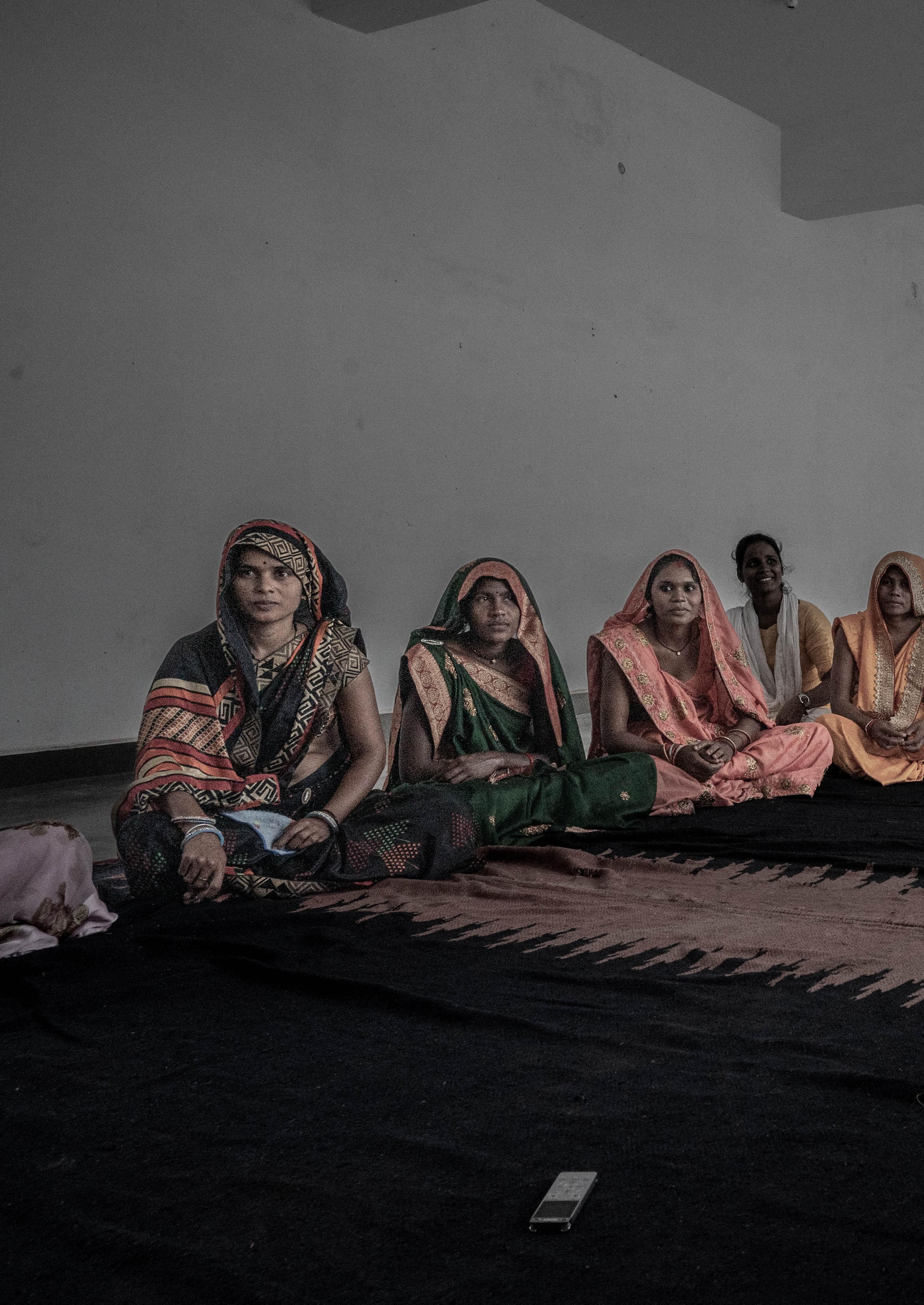
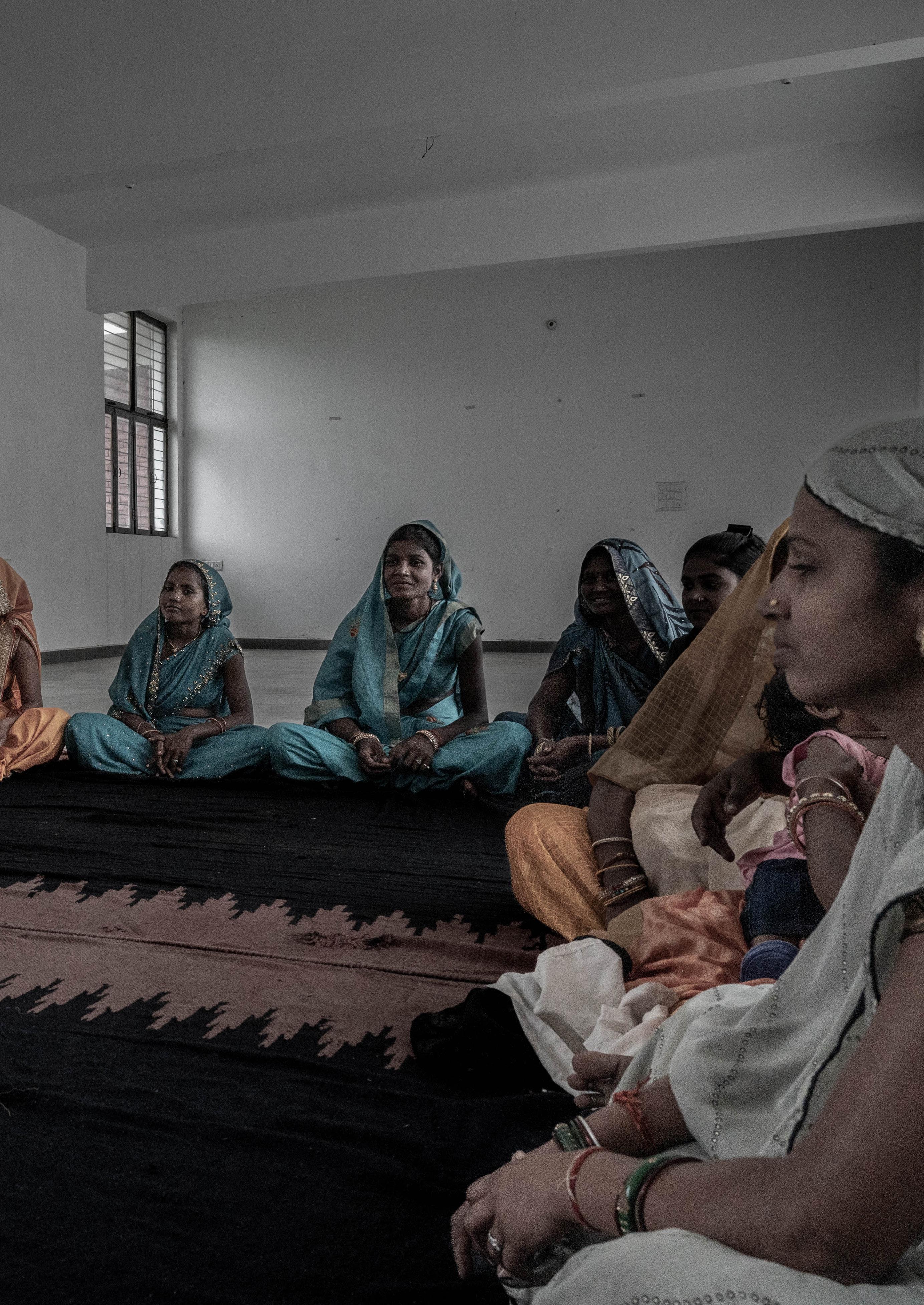
Governing Council1:
Pari Jhaveri, Chairperson
Preeta Lall, Treasurer
N.K. Malhotra, Secretary
Krishna Menon, Member
Kaadambari, Member
Debarpita Banerjee, Member
Ayush Chauhan, Member
National Team:
Amit Goyal
Aparna Bhaumik
Bharani Sundararajan
Darshan Surendranath
Ganga Gupta
Kanika Kaul
Naveen Verma
Nidhi Kumari
Paritosh Sasmal
Praveena Anand
Rita Sarin2
Ruchi Yadav
Saem Hashmi
Seereen A. Choudhury
Shiw Shankar Mahato
Surbhi Mahajan
Veda Bharadwaja
National Team Support Staff:
Bhushan Giri
Subrata Sahoo
Vicky
State Teams:
Bihar:
Shahina Perween
Ratan Kumar
Karnataka:
Somashekhar A.
Padmini Ananth
Vinodh P.
Madhya Pradesh:
Shibani Sharma
Nitendra Gupta
Odisha:
Sukanta Mohapatra
Nancy Rout
Harihar Debata
Santosh Mohanty
Rajasthan:
Virendra Shrimali
Astha Rastogi
Hemlata Kumawat
Renuka Sharma
Uttarakhand:
Kamla Bhatt
Bhupendra Bisht
Himanshu Sati
1 New governing council inducted in August 2022.
2 Retired mid-year
The Hunger Project | Annual Report 2022 / 2023
American Jewish World Service
Australia High Commission
Azim Premji Foundation
BMZ, Germany (The Federal Ministry of Economic Cooperation and Development)
Forum Civ
THP Australia
THP Germany
THP Netherlands
THP New Zealand
THP Sweden
49
We are grateful to our donors for their support and solidarity
CONTACT US
The Hunger Project | Annual Report 2022 / 2023
NEW DELHI:
11/1, Sarvapriya Vihar, New Delhi – 110016
Ph: 011-41688847/40519106/40519075
BIHAR:
House No. – 102, Road No. - 21
Shri Krishna Nagar
Patna - 800001
Ph: 0612-2521705
KARNATAKA:
#214, Ground Floor, Yashodha Nilayam, 14th “A” Cross, R T Nagar, 2nd Block, Bangalore - 560032
Ph: 080-23554580
MADHYA PRADESH:
MIG-136, Bagmugaliya Extension, Housing Board Colony, Bhopal - 462043
Ph: 0755-2424736
ODISHA:
D-14, Harekrushna Villa, Botanda, Sunderpada, Khordha - 751002
Ph: 09124908977
RAJASTHAN:
B-3, Ground Floor, Hari Marg, Civil Lines, Jaipur - 302006
Ph: 0141-2223123
UTTARAKHAND:
C-1, Chandra Mauli, J. K. Puram, Mukhani, Haldwani - 263139
Ph: 05946-280188
51
@thehungerprojectindia
The Hunger Project India
@THP_Ind
thehungerprojectindia
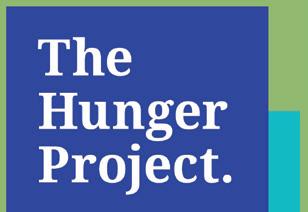
http://thpindia.org






























